小学六年级英语总复习知识归类
- 格式:doc
- 大小:89.50 KB
- 文档页数:12
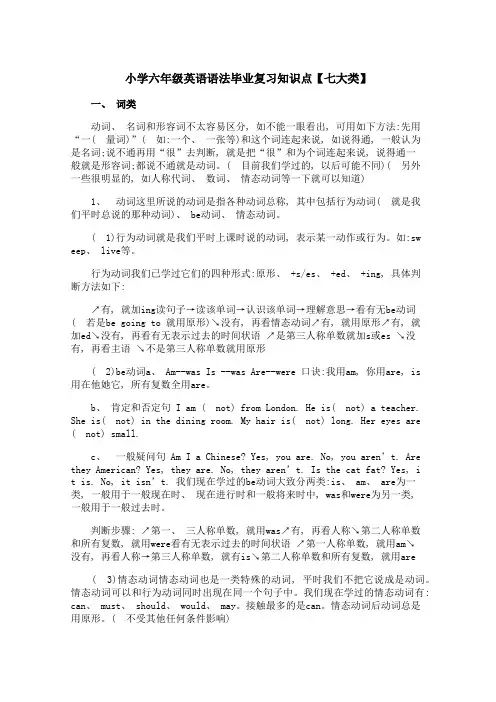
小学六年级英语语法毕业复习知识点【七大类】一、词类动词、名词和形容词不太容易区分, 如不能一眼看出, 可用如下方法:先用“一( 量词)”( 如:一个、一张等)和这个词连起来说, 如说得通, 一般认为是名词;说不通再用“很”去判断, 就是把“很”和为个词连起来说, 说得通一般就是形容词;都说不通就是动词。
( 目前我们学过的, 以后可能不同)( 另外一些很明显的, 如人称代词、数词、情态动词等一下就可以知道)1、动词这里所说的动词是指各种动词总称, 其中包括行为动词( 就是我们平时总说的那种动词)、 be动词、情态动词。
( 1)行为动词就是我们平时上课时说的动词, 表示某一动作或行为。
如:sw eep、 live等。
行为动词我们已学过它们的四种形式:原形、 +s/es、 +ed、 +ing, 具体判断方法如下:↗有, 就加ing读句子→读该单词→认识该单词→理解意思→看有无be动词( 若是be going to 就用原形)↘没有, 再看情态动词↗有, 就用原形↗有, 就加ed↘没有, 再看有无表示过去的时间状语↗是第三人称单数就加s或es ↘没有, 再看主语↘不是第三人称单数就用原形( 2)be动词a、 Am--was Is --was Are--were 口诀:我用am, 你用are, is用在他她它, 所有复数全用are。
b、肯定和否定句 I am ( not) from London. He is( not) a teacher. She is( not) in the dining room. My hair is( not) long. Her eyes are ( not) small.c、一般疑问句Am I a Chinese? Yes, you are. No, you aren’t. Are they American? Yes, they are. No, they aren’t. Is the cat fat? Yes, it is. No, it isn’t. 我们现在学过的be动词大致分两类:is、 am、 are为一类, 一般用于一般现在时、现在进行时和一般将来时中, was和were为另一类,一般用于一般过去时。
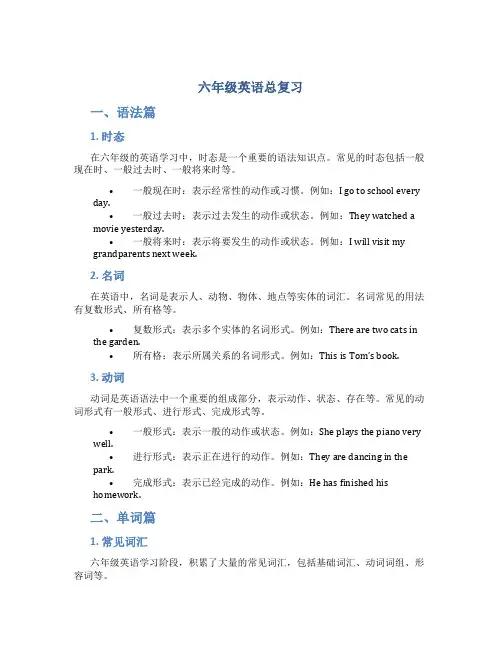
六年级英语总复习一、语法篇1. 时态在六年级的英语学习中,时态是一个重要的语法知识点。
常见的时态包括一般现在时、一般过去时、一般将来时等。
•一般现在时:表示经常性的动作或习惯。
例如:I go to school every day.•一般过去时:表示过去发生的动作或状态。
例如:They watched a movie yesterday.•一般将来时:表示将要发生的动作或状态。
例如:I will visit my grandparents next week.2. 名词在英语中,名词是表示人、动物、物体、地点等实体的词汇。
名词常见的用法有复数形式、所有格等。
•复数形式:表示多个实体的名词形式。
例如:There are two cats in the garden.•所有格:表示所属关系的名词形式。
例如:This is Tom’s book.3. 动词动词是英语语法中一个重要的组成部分,表示动作、状态、存在等。
常见的动词形式有一般形式、进行形式、完成形式等。
•一般形式:表示一般的动作或状态。
例如:She plays the piano very well.•进行形式:表示正在进行的动作。
例如:They are dancing in the park.•完成形式:表示已经完成的动作。
例如:He has finished his homework.二、单词篇1. 常见词汇六年级英语学习阶段,积累了大量的常见词汇,包括基础词汇、动词词组、形容词等。
•基础词汇:包括人称代词、数字、家庭成员、颜色等。
例如:I, you, he, she, it, we, they, one, two, three, father, mother, brother, sister, red, blue,green等。
•动词词组:一些常见的动词搭配词组。
例如:get up, go to school, have breakfast, do homework, play basketball等。
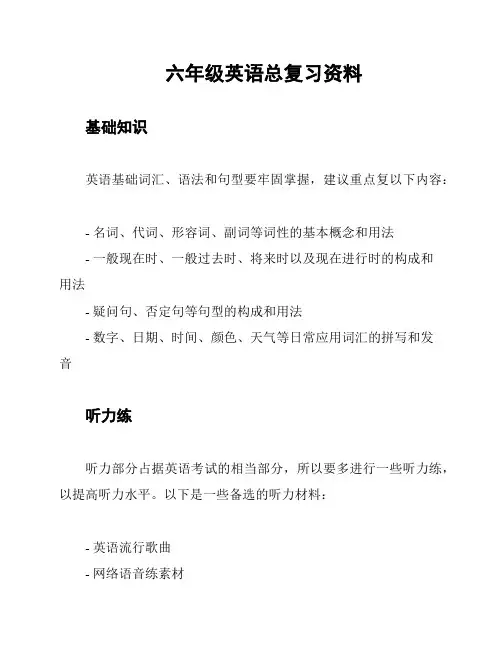
六年级英语总复习资料
基础知识
英语基础词汇、语法和句型要牢固掌握,建议重点复以下内容:
- 名词、代词、形容词、副词等词性的基本概念和用法
- 一般现在时、一般过去时、将来时以及现在进行时的构成和
用法
- 疑问句、否定句等句型的构成和用法
- 数字、日期、时间、颜色、天气等日常应用词汇的拼写和发
音
听力练
听力部分占据英语考试的相当部分,所以要多进行一些听力练,以提高听力水平。
以下是一些备选的听力材料:
- 英语流行歌曲
- 网络语音练素材
- 录音机录制自身朗读的英语材料
口语练
英语口语练是提高英语水平的重要途径,建议多进行一些口语练,同时在口语练中寻求不同的交流场合,以提高英语表达能力。
可以选择以下口语练方式:
- 和外教进行一对一口语练
- 参加英语口语角
- 加入英语社区,在社区中交流和分享研究心得
阅读练
阅读是提高英语理解和阅读能力的重要途径,可以多选择以下练方式:
- 阅读英文书籍,建议选择适合阅读水平的英文原著
- 阅读英文新闻,建议选择有词汇注释的新闻网站
- 阅读英文杂志,建议选择感兴趣的主题材料
写作练
写作是提高英语表达能力和阅读能力的重要途径,可以选择以下练方式:
- 写博客,分享自己的研究心得和经验
- 每日写作练,就一些简单的主题写下自己的想法和感受
- 参加英语写作比赛,切磋提高自己的水平
总结
以上是六年级英语总复习资料的一些建议和练习方法,需要进行有节奏的训练,多角度全方位提高英语水平,从而取得满意的成绩。
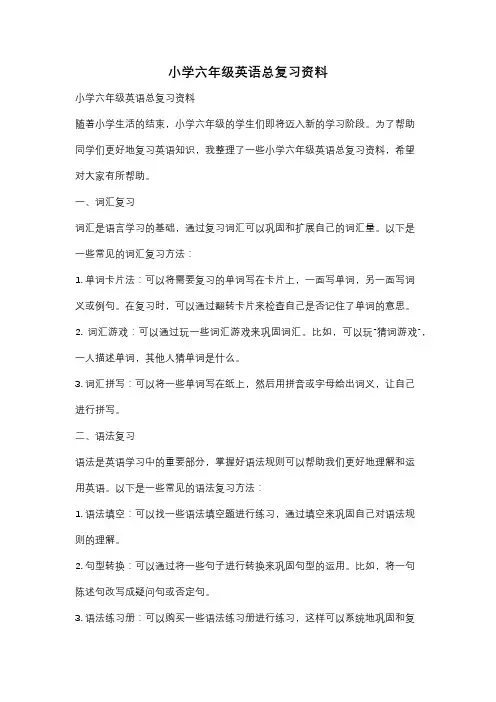
小学六年级英语总复习资料小学六年级英语总复习资料随着小学生活的结束,小学六年级的学生们即将迈入新的学习阶段。
为了帮助同学们更好地复习英语知识,我整理了一些小学六年级英语总复习资料,希望对大家有所帮助。
一、词汇复习词汇是语言学习的基础,通过复习词汇可以巩固和扩展自己的词汇量。
以下是一些常见的词汇复习方法:1. 单词卡片法:可以将需要复习的单词写在卡片上,一面写单词,另一面写词义或例句。
在复习时,可以通过翻转卡片来检查自己是否记住了单词的意思。
2. 词汇游戏:可以通过玩一些词汇游戏来巩固词汇。
比如,可以玩“猜词游戏”,一人描述单词,其他人猜单词是什么。
3. 词汇拼写:可以将一些单词写在纸上,然后用拼音或字母给出词义,让自己进行拼写。
二、语法复习语法是英语学习中的重要部分,掌握好语法规则可以帮助我们更好地理解和运用英语。
以下是一些常见的语法复习方法:1. 语法填空:可以找一些语法填空题进行练习,通过填空来巩固自己对语法规则的理解。
2. 句型转换:可以通过将一些句子进行转换来巩固句型的运用。
比如,将一句陈述句改写成疑问句或否定句。
3. 语法练习册:可以购买一些语法练习册进行练习,这样可以系统地巩固和复习各个语法知识点。
三、阅读理解复习阅读理解是英语学习中的重要技能,通过阅读可以帮助我们提高阅读理解能力和词汇量。
以下是一些常见的阅读理解复习方法:1. 阅读文章:可以选择一些适合自己水平的英语文章进行阅读,通过阅读来提高自己的阅读理解能力。
2. 阅读训练:可以找一些阅读训练题进行练习,通过做题来巩固自己的阅读理解能力。
3. 阅读策略:可以学习一些阅读策略,比如扫读、略读等,这样可以更高效地理解和记忆文章内容。
四、口语练习口语是英语学习中的重要部分,通过口语练习可以提高自己的口语表达能力和听力能力。
以下是一些常见的口语练习方法:1. 对话练习:可以找一个语伴或者同学一起进行对话练习,通过对话来提高自己的口语表达能力。
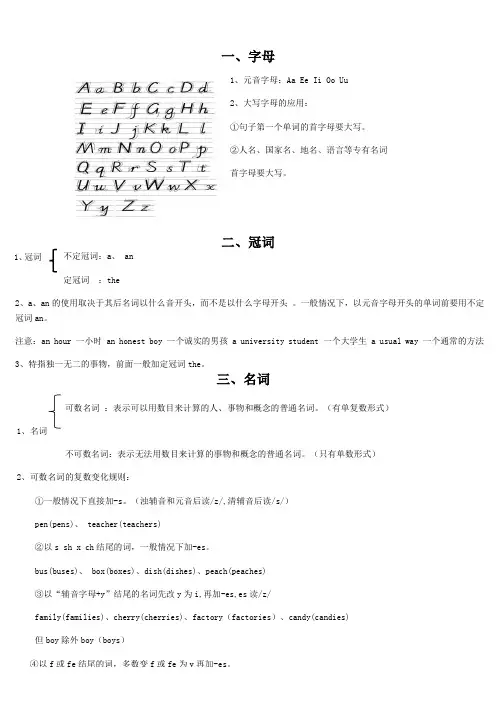
一、字母二、冠词1、元音字母:Aa Ee Ii Oo Uu2、大写字母的应用:①句子第一个单词的首字母要大写。
②人名、国家名、地名、语言等专有名词 首字母要大写。
不定冠词:a 、 an 定冠词 :the2、a 、an 的使用取决于其后名词以什么音开头,而不是以什么字母开头 。
一般情况下,以元音字母开头的单词前要用不定冠词an 。
注意:an hour 一小时 an honest boy 一个诚实的男孩 a university student 一个大学生 a usual way 一个通常的方法 3、特指独一无二的事物,前面一般加定冠词the 。
Eg:The Great Wall is in China.长城在中国。
三、名词可数名词 :表示可以用数目来计算的人、事物和概念的普通名词。
(有单复数形式) 1、名词不可数名词:表示无法用数目来计算的事物和概念的普通名词。
(只有单数形式) 2、可数名词的复数变化规则:①一般情况下直接加-s 。
(浊辅音和元音后读/z/,清辅音后读/s/) pen(pens)、 teacher(teachers)②以s sh x ch 结尾的词,一般情况下加-es 。
bus(buses)、 box(boxes)、dish(dishes)、peach(peaches) ③以“辅音字母+y ”结尾的名词先改y 为i,再加-es,es 读/z/family(families)、cherry(cherries)、factory (factories )、candy(candies) 但boy 除外boy (boys )④以f 或fe 结尾的词,多数变f 或fe 为v 再加-es 。
四、代词(一) 人称代词 物主代词 反身代词 主格 宾格 形容词性 名词性单数 I me my mine myself 第一人称复数 we us our ours ourselves 单数 yourself 第二人称 you you your yours复数 yourselves he him his his himself单数 she her her hers herself第三人称 it it its its itself 复数 they them their theirs themselves1、形容词性物主代词后可加名词,名词性物主代词后不可加名词。
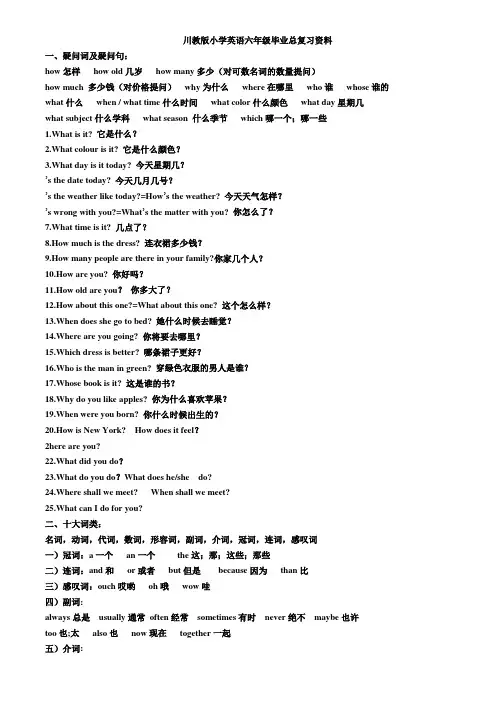
川教版小学英语六年级毕业总复习资料一、疑问词及疑问句:how怎样how old几岁how many多少(对可数名词的数量提问)how much 多少钱(对价格提问)why为什么where在哪里who谁whose谁的what什么when / what time什么时间what color什么颜色what day星期几what subject什么学科what season 什么季节which哪一个;哪一些1.What is it? 它是什么?2.What colour is it? 它是什么颜色?3.What day is it today? 今天星期几?’s the date today? 今天几月几号?’s the weather like today?=How’s the weather? 今天天气怎样?’s wrong with you?=What’s the matter with you? 你怎么了?7.What time is it? 几点了?8.How much is the dress? 连衣裙多少钱?9.How many people are there in your family?你家几个人?10.How are you? 你好吗?11.How old are you?你多大了?12.How about this one?=What about this one? 这个怎么样?13.When does she go to bed? 她什么时候去睡觉?14.Where are you going? 你将要去哪里?15.Which dress is better? 哪条裙子更好?16.Who is the man in green? 穿绿色衣服的男人是谁?17.Whose book is it? 这是谁的书?18.Why do you like apples? 你为什么喜欢苹果?19.When were you born? 你什么时候出生的?20.How is New York? How does it feel?2here are you?22.What did you do?23.What do you do?What does he/she do?24.Where shall we meet? When shall we meet?25.What can I do for you?二、十大词类:名词,动词,代词,数词,形容词,副词,介词,冠词,连词,感叹词一)冠词:a一个an一个the这;那;这些;那些二)连词:and和or或者but但是because因为than比三)感叹词:ouch哎哟oh哦wow哇四)副词:always总是usually通常often经常sometimes有时never绝不maybe也许too也;太also也now现在together一起五)介词:in在…里on在…上under在…下near在…旁边by在…旁边beside在…旁边behind在…后边next to与…相邻opposite在…对面in front of在…前面at 在…inside在…里面outside在…外面before在…之前(时间)after在…之后between…and在…(两者)之间with和(表伴随)for对于;为了(后通常接n.或v-ing)六)形容词:一、形容词原级:big大的small小的long长的short短的;矮的tall / high高的low低的old旧的;古老的young年轻的new新的dear/ expensive昂贵的cheap便宜的fat胖的thin瘦的happy开心的sad悲伤的hungry饥饿的full饱的beautiful漂亮的pretty美丽的nice漂亮的;好看的;友善的ugly丑的easy容易的difficult / hard 难的interesting有趣的fun / funny有趣的boring无聊的important重要的useful有用的useless无用的thirsty口渴的juicy多汁的round圆的sweet甜的sour / tart酸的hot热的cold冷的warm温暖的cool凉爽的strong强壮的friendly友好的hard硬的soft软的fast快的slow慢的careful小心的early早的late迟的bright 明亮的/聪明的smart聪明的clever聪明的curly卷曲的straight直的favourite最喜爱的quiet安静的noisy吵闹的tired疲劳的angry生气的good好的bad坏的great 太好了kind善良的fine(身体)好的cute/ lovely可爱的many许多的more更多的afraid害怕的right对的wrong错的true正确的false错误的back后面的usual平常的dirty脏的clean干净的wonderful好的delicious=yummy美味的yucky难吃的far远的near近的smooth光滑的rough粗糙的heavy重的light轻的busy繁忙的二、形容词比较级:1. 直接+ercheaper更便宜的longer更长的taller更高的shorter更矮/短的younger更年轻的older更老的stronger更强壮的smaller更小的2.重读闭音节词,双写末字母,再加er(辅+元+辅)hotter更热的bigger更大的fatter更胖的thinner更瘦的3.辅音字母+y结尾的词,改y为i,再加erprettier更漂亮的easier更简单的earlier更早的happier更开心的4.不规则变化good-better-best many-more-most三、气象(用形容词表示):weather天气: cold寒冷的warm暖和的cool凉爽的hot炎热的sunny晴朗的rainy下雨的windy有风的snowy下雪的cloudy多云的overcast多云的fine好的/晴朗的foggy有雾的1. How is the weather (today)? It's fine. / It's a cloudy day .2.Spring is here. It's getting warm. (季节与天气)七)代词:人称代词主格:I 我we我们you你,你们he 他she她it它they他们人称代词宾格:me我us我们you你,你们him他her她it它them他们形容词性物主代词:my我的our我们的your你的,你们的his他的her她的its它的their他们的(后接名词)名词性物主代词:mine我的ours我们的yours你的,你们的his他的hers她的its它的theirs他们的(后不接名词)指示代词:this这个that那个these这些those那些不定代词:some一些(常用于肯定句)any任何(常用于否定句或疑问句)something某物anything任何东西someone某人anyone任何人1.Is this / that / it...? 肯定:Yes, it is. 否定:No, it isn’t.2.Are these / those...? 肯定:Yes, they are. 否定:No, they aren’t.3.What’s this / that / it? It’s a / an...4.What are these / those? They are...5.There are some flowers in front of the house.(肯定句)There are not any flowers in front of the house.(否定句)Are there any flowers in front of the house?(疑问句)肯定:Yes,there are. 否定:No, there aren’t.八)数词一、基数词:number数字: zero零one一two二three三four四five五six六seven七eight八nine 九ten十eleven十一twelve十二thirteen十三fourteen十四fifteen十五sixteen十六seventeen十七eighteen十八nineteen十九twenty二十thirty三十forty四十fifty五十sixty 六十seventy七十eighty八十ninety九十hundred百thousand千规律:13-19表“十几”,以teen结尾20-90表“几十”,以ty 结尾二、序数词:first第一second第二third第三fourth第四fifth第五sixth第六seventh第七eighth第八ninth第九tenth第十eleventh第十一twelfth第十二thirteenth第十三fourteenth第十四fifteenth第十五sixteenth第十六seventeenth第十七eighteenth第十八nineteenth第十九twentieth第二十twenty-first第二十一twenty-second第二十二thirtieth第三十thirty- first第三十一fortieth第四十fiftieth第五十sixtieth第六十seventieth第七十eightieth第八十ninetieth第九十1. Who is the first ? Lele is(the first).2. What is the date today? It is September 7th.3. When is your birthday? It's on October the third. / It's on October 3rd.九)动词:一、情态动词:can能may可以must必须would将should应该could可以;能will将;将要shall将(用于第一人称I / We)二、助动词:be have / has do / does /did shall should will would三、系动词:(be动词)“是”am is are was were(感官动词)sound听起来taste尝起来feel摸起来smell闻起来look看起来四、实义动词:play玩、演奏swim游泳skate滑冰fly飞jump跳walk走run跑climb爬ride骑eat吃sleep睡like喜欢/像have有,吃live居住take带着;买;花费study / learn 学习sing唱歌dance跳舞thank谢谢love爱work工作drink喝meet遇见welcome欢迎help帮助open打开close关上read读write写come 来go去drive驾驶wash洗think想wear穿use使用tell告诉stop停sit坐stand站listen听find寻找/找到draw / paint画画see看见turn转动speak说话want想要do做talk交谈catch抓住cook做饭say表达、说past经过make制作hear听见miss错过/想念worry担心visit参观clean打扫wait等候clap鼓掌cry哭laugh笑move移动shout喊叫pick摘act表演bloom开花put放cut切ask问answer回答hit打need需要五、动词第三人称单数do--does做go--goes去teach--teaches教watch--watches看have--has 有;吃;喝look--looks看feel--feels感觉起来smell--smells闻起来taste--tastes尝起来sound---sounds听起来六、动词过去式stay--stayed停留start--started开始look--looked看play--played玩耍like--liked喜欢practise--practised练习dance--danced跳舞study--studied学习stop--stopped停止come--came来go--went去build--built修建feel--felt感觉take--took买;花费eat --ate吃have / has--had有;吃;上课do / does --did做am / is --was是are --were是七、动词短语(一周、一天的活动)go home回家go to bed上床睡觉go out出去go to the park去公园go for an outing去郊游go to the zoo去动物园go to the cinema看电影go to school去上学go home回家go fishing去钓鱼go swimming去游泳go skating滑冰go shopping购物do sports做运动do homework做家庭作业do housework做家务do word exercises做词汇练习do some cooking做饭do taijiquan打太极拳make tea 沏茶make a card做卡片make a cake做蛋糕make a list of 列出一张……单子make a phone call打电话celebrate Christmas庆祝圣诞节celebrate the harvest庆祝丰收tell a story讲故事tell jokes讲笑话send flowers送花send cards送卡片wait a minute等一会儿wait for a classmate等同学clean the house打扫房间clean the blackboard擦黑板clean the classroom打扫教室watch TV看电视wash the clothes洗衣服do / wash the dishes洗碗wash the cups洗杯子wash my face洗脸wash my hair洗头发raise your foot抬脚wave my arm挥手臂touch his head摸头show you around带你参观drink water喝水come with me随我来put on 穿上get up起床get ready准备好get to school到达学校get home到家cook the meals做饭set the table摆饭桌fly a kite放风筝draw a picture画画read a book看书listen to music听音乐drink water喝水stand up起立sit down坐下hurry up赶快look after照顾look for寻找look at看look up查阅pick up捡起chant in English用英语诵读learn English学英语speak English说英语listen to English everyday每天听英语practice English练习英语sing English songs唱英语歌曲keep...clean保持干净eat fruit吃水果eat ice cream吃冰激凌help yourself to随便吃点used to过去常常dress up as精心打扮成follow the witch跟着女巫be made of pumpkins由南瓜制成be afraid of害怕be careful小心leaves fall叶落plants grow植物生长wind blows 刮风try to试着eat moon cakes吃月饼play tricks on 捉弄play cards打牌play the violin拉小提琴play the piano弹钢琴play football踢足球play basketball 打篮球play volleyball打排球play badminton打羽毛球play table tennis打乒乓球play games做游戏ride a bike骑自行车turn yellow变黄turn left向左转turn right向右转turn on the TV打开电视turn on the light开灯turn off the light关灯turn off the computer关电脑open the window开窗close the door关门give us presents给我们礼物pull the sleigh拉雪橇come down从……下来ride a bike骑自行车row a boat划船climb a mountain爬山have a party举行晚会have a picnic去野餐have some juice喝点果汁have breakfast吃早饭have lunch吃午饭have dinner / supper吃晚饭have a rest休息一下have an English class / lesson上英语课have some water喝水have a fever发烧have a cough咳嗽have a (bad) cold(重)感冒have a headache头痛have a stomach ache胃痛;肚子痛have a good sleep睡个好觉see a doctor看医生see a film看电影take some medicine吃药take a picture / photo照相take a seat / sit down坐下take it easy别紧张take exercise做运动take a shower洗淋浴stay in bed待在床上stay at home待在家里run away from home离家出走十)名词:一、颜色colourred红blue蓝yellow黄green绿white白black黑pink粉红orange橙brown棕purple紫grey / gray 灰色black and white黑白相间colour颜色/给…涂颜色1. What colour is the bag? It's pink.2. What is your favourite colour? It's pink.(注:下划线处可替换)3.Which dress is better? The green one.二、职业jobteacher教师player运动员pupil / student学生farmer农民cook厨师doctor医生nurse护士driver驾驶员taxi-driver出租车司机dancer舞蹈演员singer歌唱家worker工人engineer工程师waiter服务员waitress女服务员policeman警察policewoman女警察postman邮递员fireman消防员milkman牛奶工muffin man松饼师writer作家artist / painter画家TV reporter电视台记者对职业提问:1. What do you do?=What’s your job?=What are you? I’m a / an+职业.2. What does your aunt do?=What’s your aunt’s job?=What’s your aunt?She is a / an+职业.三、场所school学校:teaching building教学楼teachers’ office教师办公室classroom教室art room美术室music room音乐室computer room计算机室library 图书馆toilet厕所playground操场home家:room房间bedroom卧室living room客厅dining room饭厅bathroom浴室study书房kitchen厨房house房子farm农场zoo动物园supermarket 超市shop商店garden花园beach海滩bookshop / bookstore书店cinema电影院post office邮局police office警察局factory工厂hospital医院restaurant饭馆park公园bank银行river河流lake湖泊sea大海desert 沙漠grassland草原forest森林mountain高山earth地球sky天空moon月球1.Where do camels live? They live in the desert.2.Where do you live? We live on the earth.3.Where does he / she work? He / She works in a restaurant.4.Where does Peter work? Peter works on a farm.5.Where are you going? We are going to the park.四、身体部位bodybody身体head头face脸hair头发nose 鼻子mouth嘴eye眼睛ear耳朵heart心tooth/teeth牙齿shoulder肩膀arm手臂hand手finger手指wrist手腕tummy肚子leg腿knee膝盖foot/feet脚toe脚趾back背tail 尾巴wing翅膀1.指令性动作:Open your eyes. Close your mouth.2. I have two ears, I can hear. I have two eyes, I can see. ...3.身体与健康:1)What’s wrong / the matter with you? I have a headache.2)You should / You’d better have a rest.3)You shouldn’t / You’d better not play football.注:You’d better = You had better五、形状shapecircle圆形square 正方形rectangle长方形triangle三角形heart心形star星形oval椭圆形diamond菱形;钻石六、学习用品和书籍pen钢笔pencil铅笔crayon蜡笔ball pen圆珠笔ruler尺子pencil-box / pencil-case铅笔盒book书textbook课本storybook故事书workbook练习册notebook笔记本Chinese book语文书newspaper报纸(an) English book(一本)英语书math book数学书bag包schoolbag书包eraser / rubber橡皮擦paint颜料paintbrush画笔pencil sharpener卷笔刀1.Whose notebook is it? It is my notebook. It is mine.2.Whose pencil is this / that?It is her pencil. It is hers. It is Tingting’s.七、食品,饮料food / drinkfood食物: breakfast早餐lunch午餐dinner / supper 晚餐rice米饭egg蛋fish鱼cake蛋糕hamburger汉堡包noodles面条meat肉chicken鸡肉ice cream冰激凌bread面包sandwich三明治hot dog热狗candy糖果soup汤butter黄油cheese奶酪chips炸薯条salad沙拉fried chicken炸鸡块junk food垃圾食品dumplings饺子biscuit饼干pie派corn玉米pumpkin南瓜potato土豆tomato西红柿sweet potato红薯moon cake月饼turkey火鸡vegetable蔬菜lettuce生菜carrot胡萝卜pea豌豆cabbage卷心菜drink饮料: tea茶water水milk牛奶coffee咖啡coke可乐juice果汁orange juice橘汁apple juice苹果汁1. I feel hungry / thirsty. You’d better have a / an / some (pear / apple / bread ).2. What food do you like best? I like hamburgers.3. What's for supper? Chicken, fish and vegetables.八、水果fruitfruit水果: apple苹果banana香蕉pear梨orange橙子pineapple菠萝peach桃子strawberry草莓watermelon西瓜lemon柠檬mango芒果cherry樱桃litchi荔枝plum李子tangerine橘子dragon fruit火龙果kiwi fruit猕猴桃grape葡萄九、衣服clothesclothes衣服:shirt衬衫blouse女士衬衫T-shirt T恤衫skirt短裙dress连衣裙jeans牛仔裤shoe鞋子sweater毛衣coat外套trousers/pants裤子shorts 短裤socks袜子stocking长统袜cap鸭舌帽hat帽子1. How much is this cap? It's seven dollars. / It's six yuan.2. What do you wear in spring? We wear shirts and jeans.3. What does he / she wear in winter? He / She wears coats and caps.4. Summer is here. It's getting hot.We wear T-shirts and skirts.十、交通工具bike自行车bus公共汽车train火车ship轮船boat小船car小汽车taxi出租车plane飞机truck卡车jeep吉普车subway 地铁sleigh雪橇walk = on foot步行1. How did you come here? I came here by car.2. How do you get there? We get there on foot.十一、课程subjectsubject学科: Chinese语文(中文)math / maths数学English英语art美术(艺术)PE体育ME思想品德music 音乐computer计算机social studies社会science科学十二、植物plantflower花rose玫瑰carnation康乃馨leaf(复数leaves)树叶grass草tree树十三、时间day天today今天tomorrow明天yesterday昨天morning早晨noon中午afternoon下午evening晚上night夜晚every day每天next year明年next month下个月next week下周next day = tomorrow明天hour hand时针minute hand分针second hand秒针表将来的: next week下周next weekend下周末next year明年next month 下个月next Sunday 下星期天表过去的: last weekend 上周末last week上周last year去年last month上个月last Sunday 上个星期天十四、星期weekweek周;星期Monday / Mon.星期一Tuesday / Tues.星期二Wednesday / Wed.星期三Thursday / Thur.星期四Friday / Fri.星期五Saturday / Sat.星期六Sunday / Sun.星期日weekend周末on / at the weekend在周末next week下周1、When is he / she going to Hong Kong ? Tomorrow morning.2、What day is it today? It's Monday.十五、月份monthmonth月份:January / Jan.一月February / Feb.二月March / Mar.三月April 四月May五月June六月July七月August / Aug.八月September / Sept.九月October / Oct.十月November / Nov.十一月December / Dec.十二月1.When is your brother's birthday? It's in May. / It's on May 5th.2.When is Children’s Day? It’s on June 1st.十六、季节seasonseason季节: spring春summer夏autumn / fall秋winter冬1. How many seasons are there in a year? There are four.2. When is spring? It’s from March to May.3. What’s the weather like in spring? It’s warm.4. How’s the weather in summer? It’s hot.十七、人物(家庭与朋友)people人:children孩子们family家庭friend朋友man(复数men)男人woman(复数women)女人Mr/sir先生Miss小姐Mrs夫人Ms女士boy男孩girl女孩baby婴儿mother / mummy / mum妈妈father / daddy / dad爸爸aunt阿姨;舅妈uncle 叔叔;舅舅sister姐妹brother兄弟daughter女儿son儿子parent父/母亲grandparent祖父(母)classmate同学witch女巫ghost鬼grandma / grandmother / granny(外)祖母(奶奶、外婆)grandpa / grandfather/ granddad(外)祖父(爷爷、外公)1.What's your father?/ What does your father do? He is a doctor.2.Who is the man in green? He is my uncle.十八、动物animalanimal动物: pet宠物cat猫dog狗pig猪duck鸭子duckling小鸭子horse马elephant大象fish鱼bird鸟snake蛇mouse/rat老鼠deer鹿reindeer驯鹿panda熊猫shark鲨鱼whale鲸camel骆驼giraffe长颈鹿bear熊lion狮子tiger老虎fox狐狸goat 山羊kid小山羊/小孩sheep绵羊lamb小羊chick小鸡cock / rooster公鸡hen母鸡turkey火鸡wolf 狼cow奶牛bee蜜蜂monkey 猴子rabbit兔子butterfly蝴蝶dragonfly蜻蜓fly苍蝇ant蚂蚁ladybug瓢虫insect昆虫swallow燕子turtle / tortoise乌龟spider蜘蛛bat蝙蝠frog青蛙donkey驴squirrel松鼠parrot鹦鹉caterpillar毛毛虫1.Horses can run. Rabbits can jump. Snakes can make holes. Swallows can build nests.2.A wolf is after all a wolf. 狼终究是狼。
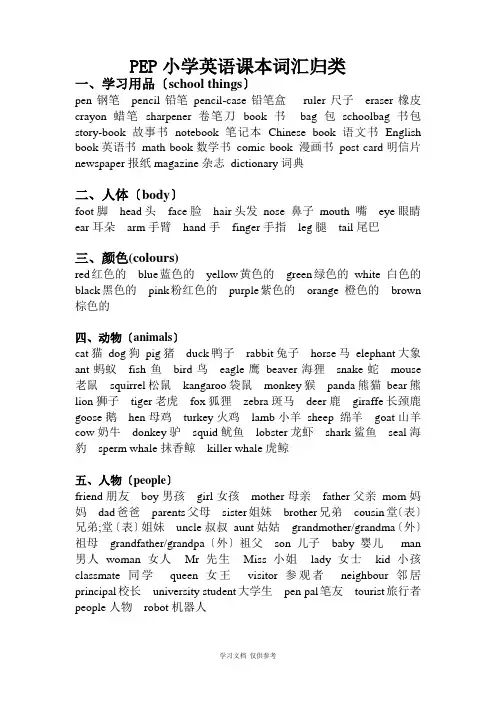
PEP小学英语课本词汇归类一、学习用品〔school things〕pen钢笔pencil铅笔pencil-case铅笔盒ruler尺子eraser橡皮crayon蜡笔sharpener卷笔刀book书bag包schoolbag 书包story-book故事书notebook笔记本Chinese book语文书English book英语书math book数学书comic book 漫画书post card明信片newspaper报纸magazine杂志dictionary词典二、人体〔body〕foot脚head头face脸hair头发nose 鼻子mouth 嘴eye眼睛ear耳朵arm手臂hand手finger手指leg腿tail尾巴三、颜色(colours)red红色的blue蓝色的yellow黄色的green绿色的white 白色的black黑色的pink粉红色的purple紫色的orange 橙色的brown 棕色的四、动物〔animals〕cat猫dog狗pig猪duck鸭子rabbit兔子horse马elephant大象ant蚂蚁fish鱼bird鸟eagle鹰beaver海狸snake蛇mouse 老鼠squirrel松鼠kangaroo袋鼠monkey猴panda熊猫bear熊lion狮子tiger老虎fox狐狸zebra斑马deer鹿giraffe长颈鹿goose鹅hen母鸡turkey火鸡lamb小羊sheep 绵羊goat山羊cow奶牛donkey驴squid鱿鱼lobster龙虾shark鲨鱼seal海豹sperm whale抹香鲸killer whale虎鲸五、人物〔people〕friend朋友boy男孩girl女孩mother母亲father父亲mom妈妈dad爸爸parents父母sister姐妹brother兄弟cousin堂〔表〕兄弟;堂〔表〕姐妹uncle叔叔aunt姑姑grandmother/grandma〔外〕祖母grandfather/grandpa〔外〕祖父son儿子baby婴儿man 男人woman女人Mr先生Miss小姐lady女士kid小孩classmate同学queen女王visitor参观者neighbour 邻居principal校长university student大学生pen pal笔友tourist旅行者people人物robot机器人六、职业(jobs)teacher教师student学生doctor医生nurse护士driver司机farmer农民singer歌唱家writer作家actor男演员actress女演员artist画家TV reporter电视台记者engineer工程师accountant会计policeman〔男〕警察salesperson/assistant售货员cleaner清洁工baseball player棒球运发动七、食品、饮料(food&drinks)rice米饭bread面包beef牛肉milk牛奶water水egg鸡蛋fish鱼tofu豆腐cake蛋糕hot dog热狗hamburger汉堡包French fries 炸薯条cookie饼干jam果酱noodle 面条meat 肉chicken鸡肉pork猪肉mutton羊肉vegetable蔬菜salad沙拉soup汤ice冰ice-cream冰淇淋Coke可乐juice果汁tea茶coffee咖啡breakfast早餐lunch午餐dinner晚餐八、水果、蔬菜(fruit&vegetables)apple苹果banana香蕉pear梨子orange橙子watermelon西瓜grape葡萄eggplant 茄子(green beans)青豆tomato西红柿potato 土豆peach桃子strawberry草莓cucumber黄瓜onion洋葱carrot胡萝卜cabbage卷心菜九、衣服(clothes)jacket夹克衫shirt衬衫T-shirt T恤衫skirt短裙dress连衣裙jeans牛仔裤pants长裤shorts短裤socks袜子shoes鞋子sweater毛衣coat大衣raincoat雨衣sneakers胶底运动鞋slippers拖鞋sandals凉鞋boots靴子hat〔有檐的〕帽子cap 便帽sunglasses太阳镜tie领带scarf围巾gloves手套十、交通工具〔vehicles〕bike自行车bus公共汽车train火车boat小船ship轮船yacht快艇car小汽车taxi出租车jeep吉普车van小货车;面包车plane飞机subway地铁motor cycle摩托车十一、杂物〔other things〕window窗户door门desk课桌chair椅子bed床computer 电脑board写字板fan电扇light灯〔teacher’s desk 〕讲台picture图画;照片wall墙壁floor地板curtain窗帘〔trash bin〕垃圾箱〔end table〕床头柜closet柜橱mirror镜子football 足球present礼物walkman随身听lamp台灯phone sofa 沙发shelf书架fridge冰箱table桌子TV电视air-conditioner 空调key钥匙lock锁photo照片chart图表plate盘子knife 刀fork叉spoon勺子chopsticks筷子pot锅gift礼物toy玩具doll洋娃娃ball球ballon 气球kite风筝〔jigsaw puzzle 〕拼图游戏box盒子umbrella伞zipper拉链violin小提琴yo-yo溜溜球nest鸟窝hole洞tube管子toothbrush牙刷menu 菜单e-card电子卡片e-mail电子邮件traffic light交通灯money 钱medicine药十二、地点〔locations〕home 家;room房间;bedroom 卧室;bathroom卫生间;〔living room〕起居室;kitchen厨房;classroom 教室;school学校;park 公园;library 图书馆;〔post office〕邮局;hospital医院;cinema 电影院;bookstore书店;farm 农场;zoo动物园;garden 花园;study书房;playground 操场;canteen食堂;〔teacher’s office 〕教师办公室;gym 体育馆;washroom卫生间;〔art room〕绘画室;〔computer room〕电脑室;( music room)音乐室;( TV room)电视机房;flat公寓;company公司;factory工厂;(fruit stand )水果摊;〔pet shop 〕宠物商店;〔nature park〕自然公园;〔theme park 〕主题公园;〔science museum 〕科学博物馆;〔the Great Wall〕长城;supermarket 超市;bank银行;country 国家;village乡村;city 城市;十三、课程〔classes〕sports体育运动science科学(Moral Education)思想品德课〔Social Studies 〕社会课十四、国家、城市〔countries&cities〕China /PRC中国;America/USA美国;UK 联合王国;England 英国;Canada/CAN 加拿大;Australia 澳大利亚;New York纽约;London 伦敦;Sydney 悉尼;Moscow莫斯科;Cairo开罗十五、气象〔weather〕weather report天气预报rainy下雨的sunny晴朗的snowy下雪的windy刮风的cloudy多云的warm温暖的cold寒冷的cool凉爽的hot炎热的十六、景物〔nature〕river河流lake湖泊stream河;溪forest森林path小道road 公路house房子bridge桥building建筑物rain雨cloud云sun太阳mountain山sky天空rainbow彩虹wind风air空气十七、植物〔plants〕flower花grass草tree树seed种子sprout苗plant植物rose玫瑰leaf叶子十八、星期〔week〕Monday星期一Tuesday星期二Wednesday星期三Thursday星期四Friday星期五Saturday星期六Sunday星期天day天weekend周末十九、月份〔months〕Jan.〔January〕一月;Feb.( February)二月;Mar.(March)三月;Apr.(April)四月;May五月;June六月;July七月;Aug.(August)八月;Sept.(September)九月;Oct.(October)十月;Nov.(Novembert)十一月;Dec.(December)十二月;date日期二十、季节(seasons)spring 春天summer 夏天fall /autumn秋天winter 冬天二十一、方位(directions)south南north北east东west西left 在左边right在右边turn left 向左转turn right 向右转二十二、患病(illness)have a fever 发烧have a cold 感冒have a toothache牙疼have a headache头疼have a sore throat 喉咙疼hurt疼痛二十三、数词〔numbers〕one 一;two 二;three 三;four 四;five 五;six 六;seven 七;eight 八;nine 九;ten 十;eleven十一;twelve 十二;thirteen 十三;fourteen 十四;fifteen 十五;sixteen 十六;seventeen 十七;eighteen 十八;nineteen 十九;twenty 二十;twenty-one 二十一;thirty 三十;forty 四十;fifty 五十;sixty 六十;seventy 七十;eighty 八十;ninety 九十hundred一百first (1st ) 第一的;second (2nd ) 第二的;third (3rd ) 第三的;fourth 第四的;fifth第五的;eighth 第八的;ninth第九的;twelfth第十二的;twentieth第二十的二十四、形容词〔adj.〕strong 强壮的;thin 瘦的;tall 高的;short 短的,矮的;big 大的;small 小的;long 长的;young 年轻的;old 老的;旧的;active 积极的;quiet 安静的;heavy 重的;cool 酷的;smart 聪明;kind 和蔼可亲的;strict 严格的;funny 滑稽可笑的;fat 胖的;tasty 可口的;yummy 好吃的;sour 酸的;sweet 甜的;salty 咸的;fresh 新鲜的;healthy 健康的;good好的;fine好的;great非常的;nice好看的;new新的;right 对的;hungry饥饿的;cute逗人喜爱的;little小的;lovely可爱的;beautiful漂亮的;colourful 色彩鲜艳的;pretty漂亮的;cheap 廉价的;expensive昂贵的;juicy 多汁的;tender嫩的;ill有病的;sick有病的;helpful有帮助的;high高的;easy简单的;proud骄傲的;favourite最喜爱的;clean干净的;tired疲劳的;excited兴奋的;angry生气的;happy高兴的;bored无聊的;sad忧愁的;taller 更高的;shorter 更矮的;stronger更强壮的;older年龄更大的;younger更年轻的;bigger 更大的;heavier更重的;longer更长的;thinner 更瘦的;smaller更小的;better 更好的;higher 更高的二十五、介词〔prep.〕in 在……里面;on 在……上面;under 在……下面;behind 在……后面;in front of 在……前面over 在……上面〔悬空〕;near 在……旁边;next to 与……相邻;二十六、代词〔pron.〕I 我;we我们;you你;你们;he他;she 她;it 它;they 他〔她;它〕们;my我的;our 我们的;your 你的;你们的;his 他的;her 她的;their他们的二十七、动词〔v.〕play玩;踢; show 展示;skate 滑冰;sleep 睡觉;run 跑;stop 停;fall 落下,跌落;feel 感觉到;fight 打架;find 寻找;fly 飞;jump 跳;dive 跳水;climb爬;swing荡秋千,摆动; know 知道;say 说,讲;see 看见;speak 讲话;kick踢;bounce反弹;ride 骑;send 寄,发送;become 变成;buy 购买;clean 打扫,清洁;come 来;go 去;drink 喝水;drive 驾驶;leave 离开;turn变成,转弯; like 喜欢;像;enjoy 从……获得乐趣;have 吃,有;eat 吃; help 帮助;love 爱,热爱;use 使用;take 乘坐,买,带;teach 教;tell 告诉,说;think 想,思考;try 尝试,试一下;open 打开;close关上;rain下雨;remember 记住;meet 遇到,碰见;study学习;learn学习;read 读,看;write写; look看;paint绘画;put 放; live居住;teach教;sing唱歌;dance跳舞;row划;welcome欢送;thank感谢; work工作;drink喝;taste常;smell闻;feed喂养;shear 剪;milk挤奶; guess猜; pass传递;stop停;wait等;find找到;fold折;wash洗;shine照耀;wear穿;answer the phone 接;catch butterflies 捉蝴蝶;count insects 数昆虫;clean the bedroom 打扫卧室;clean the room 打扫房间;climb mountains 爬山;collect leaves 收集树叶;collect stamps 收集邮票;come from 来自,从……来;come out 露出,出现;cook dinner 做饭;cook the meals 做饭;do an experiment 做实验;do homework 做作业;do housework 做家务;do morning exercises 晨练;do the dishes 洗碗碟;draw pictures 画画;eat breakfast 吃早饭;eat dinner 吃晚饭;empty the trash 倒垃圾;fly kites 放风筝;get off 下车;get to 到达;get up 起床;go hiking 去远足;go home 回家;go shopping 购物;go to bed 上床睡觉;go to school 上学;go to the cinema 去看电影;go to work 上班;have a look 看一看;have a picnic 举行野餐;have art class 上美术课;have Chinese class ;上语文课have English class 上英语课;have math class 上数学课;have music class 上音乐课;have P.E. class 上体育课;have science class 上科学课;listen tomusic 听音乐;have lunch 吃午餐;have breakfast 吃早餐;have dinner 吃晚饭;look at 看…… look for 寻找;make a snowman 堆雪人;make kites 制作风筝;make the bed 铺床;pick up leaves采摘树叶;plant trees种树;play chess下棋;play football踢足球;play ping-pong ;打乒乓球play sports 进行体育活动;play the piano 弹钢琴;play the violin 拉小提琴;play with ……玩…… put away the clothes 收拾衣服read a book 看书;read a magazine 阅读杂志;read books 看书;ride a bike 骑自行车;set the table 摆餐具;sweep the floor 扫地;take a trip 去旅行;take pictures 照相;use a computer 使用电脑visit grandparets 看望〔外〕祖父母wake up 醒,醒来;wash the clothes 洗衣服;wash the windows 擦窗户;watch insects 观察昆虫;watch TV 看电视;water the flowers 浇花;write a letter 写信;write a report写报告;write an e-mail写电子邮件。
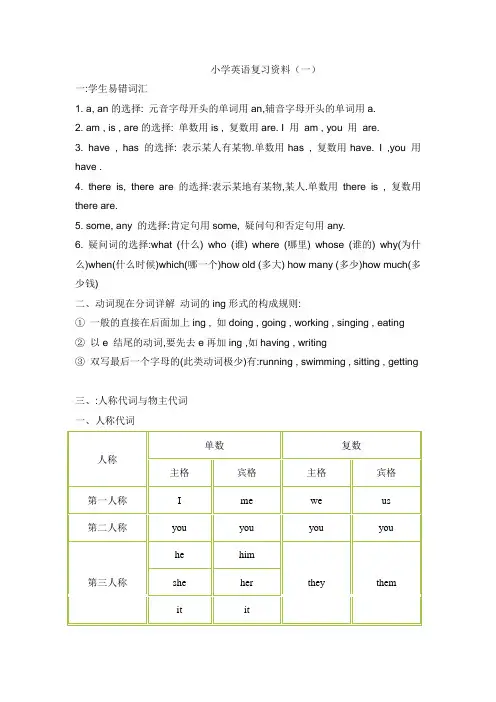
小学英语复习资料(一)一:学生易错词汇1. a, an的选择: 元音字母开头的单词用an,辅音字母开头的单词用a.2. am , is , are的选择: 单数用is , 复数用are. I 用am , you 用are.3. have , has 的选择: 表示某人有某物.单数用has , 复数用have. I ,you 用have .4. there is, there are 的选择:表示某地有某物,某人.单数用there is , 复数用there are.5. some, any 的选择:肯定句用some, 疑问句和否定句用any.6. 疑问词的选择:what (什么) who (谁) where (哪里) whose (谁的) why(为什么)when(什么时候)which(哪一个)how old (多大) how many (多少)how much(多少钱)二、动词现在分词详解动词的ing形式的构成规则:①一般的直接在后面加上ing , 如doing , going , working , singing , eating②以e 结尾的动词,要先去e再加ing ,如having , writing③双写最后一个字母的(此类动词极少)有:running , swimming , sitting , getting三、:人称代词与物主代词一、人称代词四、物主代词五、句型专项归类1.肯定句:是指用肯定的语气来陈述的句子,如:I'm a student. She is a doctor. He works in a hospital.There are four fans in our classroom. He will eat lunch at 12:00. I watched TV yesterday evening.2,否定句:含有否定词或表示否定意义词的句子,如:I'm not a student. She is not (isn't) a doctor.He does not (doesn't) work in a hospital. There are not (aren't) four fans in our classroom.He will not (won't) eat lunch at 12:00. I did not (didn't) watch TV yesterday evening.☆注意☆小结:否定句主要是在肯定句的基础上加上了否定词"not".有动词be的句子则"not"加在be后面,可缩写成"isn't,aren't",但am not 一般都分开写.没有动词be的句子则要先在主要动词的前面加上一个助动词(do,does,did),然后在它后面加上"not",你也可以把它们缩写在一起如"don't , doesn't , didn't ).这三个助动词要根据人称和时态来选择,其中"does"只用于一般现在时主语是第三人称单数的情况,而"did"只用于一般过去时,不论主语是什么人称和数,都用"did" .3,一般疑问句:是指询问事实的句子,此类句子必须用"yes",或"no"来回答.如:Are you a student Yes, I am / No, I'm not.Is she a doctor Yes, she is. / No, she isn't.Does he work in a hospital Yes, he does. / No, he doesn't.Are there four fans in our classroom Yes, there are. / No, there aren't.Are you going to buy a comic book tonight Yes, I am. / No, I am not. (Yes, we are. / No, we aren't.)Will he eat lunch at 12:00 Yes, I will. / No, I will not(won't).Are they swimming Yes, they are. / No, they aren't.☆注意☆小结:一般疑问句是在肯定句的基础上,①把动词be调到首位,其他照写,末尾标点符号变成问号即可.②没有动词be的句子则要在句首加上一个助动词(do,does,)再把紧跟在后面的动词变回原形,末尾标点符号变成问号即可.这三个助动词也要根据人称和时态来选择,其中"does"只用于一般现在时主语是第三人称单数的情况,而"did"只用于一般过去时,不论主语是什么人称和数,都用"did" .一般疑问句有个重要的原则就是问和答要一致,即问句里的第一个单词(助动词)和简略答句里的这个词是一致的.4,特殊疑问句:以特殊疑问词(what , where , who , which , when , whose , why , how等)开头引导的句子.此类句子应该问什么就答什么,不能用"yes ,no"来回答.如:What is this It's a computer.What does he do He's a doctor.Where are you going I'm going to Beijing.Who played football with you yesterday afternoon Mike.Which season do you like best Summer.When do you usually get up I usually get up at 6:30.Whose skirt is this It's Amy's.Why do you like spring best Because I can plant trees.How are you I'm fine. / I'm happy.How did you go to Xinjiang I went to Xinjiang by train.☆其中how又可以和其他一些形容词连用组成特殊疑问词组用来提问,如: how many(多少(数量)), how much(多少(钱)), how tall(多高), how long(多长), how big(多大), how heavy(多重)例句:How many pencils do you have I have three pencils.How many girls can you see I can see four girls.How many desks are there in your classroom There are 51.☆小问可结:how many 用来提数名词的数量,主要有以上三种句式搭配,How many + 名词复数+ do you have 你有多少……How many + 名词复数+ can you see 你能看见多少……How many + 名词复数+ are there… 有多少……六、:完全,缩略形式: I'm=I am he's=he is she's=she is they're=they are you're=you are there's=there is they're=they are can't=can not don't=do not doesn't=does not isn't=is not aren't=are not let's=let us won't=will not I'll=I will wasn't=was not总结:通常情况下,'m即am,'s即is(但let's=let us), 're即are ,n't即not (但can't=can not)七、小学英语词汇不完全归类表学习用品(school things):pen钢笔pencil铅笔pencil-case铅笔盒ruler尺子book书bag包comic book漫画书post card明信片newspaper报纸schoolbag书包eraser橡皮crayon蜡笔sharpener卷笔刀story-book故事书notebook笔记本Chinese book语文书English book英语书math book数学书magazine杂志dictionary词典人体(body):foot脚head头face脸hair头发nose鼻子mouth嘴eye眼睛ear耳朵arm手臂hand手finger手指leg腿tail尾巴颜色(colours):red红blue蓝yellow黄green绿white白black黑pink粉红purple紫orange橙brown棕动物(animals):cat猫dog狗pig猪duck鸭rabbit兔horse马elephant大象ant蚂蚁fish鱼bird鸟eagle鹰beaver海狸snake蛇mouse老鼠squirrel 松鼠kangaroo袋鼠monkey猴panda熊猫bear熊lion狮子tiger老虎fox 狐狸zebra斑马deer鹿giraffe长颈鹿goose鹅hen母鸡turkey火鸡lamb 小羊sheep绵羊goat山羊cow奶牛donkey驴squid鱿鱼lobster龙虾shark鲨鱼seal海豹sperm whale抹香鲸killer whale虎鲸人物(people):friend朋友boy男孩girl女孩mother母亲father父亲sister姐妹brother兄弟uncle叔叔;舅舅man男人woman女人Mr.先生Miss小姐lady女士;小姐mom妈妈dad爸爸parents父母grandparents祖父母grandma/grandmother(外)祖母grandpa/grandfather(外)祖父aunt姑姑cousin堂(表)兄弟;堂(表)姐妹son儿子daughter女儿baby婴儿kid小孩classmate同学queen女王visitor参观者neighbour邻居principal校长university student大学生pen pal笔友tourist旅行者people人物robot机器人职业(jobs):teacher教师student学生doctor医生nurse护士driver司机farmer农民singer歌唱家writer作家actor男演员actress女演员artist画家TV reporter电视台记者engineer工程师accountant会计policeman(男)警察salesperson销售员cleaner清洁工baseball player棒球运动员assistant售货员police警察食品,饮料(food & drink):rice米饭bread面包beef牛肉milk牛奶water水egg蛋fish鱼tofu豆腐cake蛋糕hot dog热狗hamburger汉堡包French fries炸薯条cookie曲奇biscuit饼干jam果酱noodles面条meat肉chicken 鸡肉pork猪肉mutton羊肉vegetable蔬菜salad沙拉soup汤ice冰ice-cream冰淇淋Coke可乐juice果汁tea茶coffee咖啡breakfast早餐lunch午餐dinner/supper晚餐meal一餐水果,蔬菜(fruit & vegetables):apple苹果banana香蕉pear梨orange橙watermelon西瓜grape葡萄eggplant茄子green beans青豆tomato西红柿potato土豆peach桃strawberry草莓cucumber黄瓜onion洋葱carrot胡萝卜cabbage卷心菜衣服(clothes):jacket夹克衫shirt衬衫T-shirt丅恤衫skirt短裙子dress连衣裙jeans牛仔裤pants长裤socks袜子shoes鞋子sweater毛衣coat上衣raincoat雨衣shorts短裤sneakers网球鞋slippers拖鞋sandals凉鞋boots 靴子hat(有沿的)帽子cap便帽sunglasses太阳镜tie领带scarf围巾gloves 手套trousers裤子cloth布交通工具(vehicles):bike自行车bus公共汽车train火车boat小船ship轮船yacht快艇car小汽车taxi出租车jeep吉普车van小货车;面包车plane/airplane飞机subway/underground地铁motor cycle摩托车杂物(other things): window窗户door门desk课桌chair椅子bed床computer计算机board写字板fan风扇light灯teacher's desk讲台picture 图画;照片wall墙壁floor地板curtain窗帘trash bin垃圾箱closet壁橱mirror 镜子end table床头柜football/soccer足球present礼物walkman随身听lamp台灯phone电话sofa沙发shelf书架fridge冰箱table桌子TV电视air-conditioner空调key钥匙lock锁photo照片chart图表plate盘子knife 刀fork叉spoon勺子chopsticks筷子pot锅gift礼物toy玩具doll洋娃娃ball球balloon气球kite风筝jigsaw puzzle拼图游戏box盒子umbrella伞zipper拉链violin小提琴yo-yo溜溜球nest鸟窝hole洞tube管子toothbrush牙刷menu菜单e-card电子卡片e-mail电子邮件traffic light交通灯money钱medicine药地点(locations):home家room房间bedroom卧室bathroom卫生间living room起居室kitchen厨房classroom教室school学校park公园library图书馆post office邮局police office警察局hospital医院cinema电影院bookstore书店farm农场zoo动物园garden花园study书房playground操场canteen食堂teacher's office教师办公室library图书馆gym体育馆washroom卫生间art room绘画教室computer room计算机教室music room 音乐教室TV room电视机房flat公寓company公司factory工厂fruit stand 水果摊pet shop宠物商店nature park自然公园theme park主题公园science museum科学博物馆the Great Wall长城supermarket超市bank银行country国家village乡村city城市hometown家乡bus stop公交车站课程(classes): sports体育运动science科学Moral Education思想品德课Social Studies社会课Chinese语文math数学PE体育课English英语课国家,城市(countries & cities): China/PRC中国America/USA美国UK联合王国England英国Canada/CAN加拿大Australia澳大利亚New York纽约London伦敦Sydney悉尼Moscow莫斯科Cairo开罗气象(weather): cold寒冷的warm温暖的cool凉爽的snowy下雪的sunny晴朗的hot炎热的rainy下雨的windy有风的cloudy多云的weather report天气预报景物(nature): river河流lake湖泊stream河;溪forest森林path小道road公路house房子bridge桥building建筑物rain雨cloud云sun太阳mountain 山sky天空rainbow彩虹wind风air空气moon月亮植物(plants): flower花grass草tree树seed种子sprout苗plant植物rose 玫瑰leaf叶子星期(week): Monday星期一Tuesday星期二Wednesday星期三Thursday星期四Friday星期五Saturday星期六Sunday星期天weekend周末月份(months): Jan. (January)一月Feb.(February)二月Mar.(March)三月April 四月May五月June六月July七月Aug.(August)八月Sept.(September)九月Oct.(October)十月Nov.(November)十一月Dec.(December)十二月季节(seasons): spring春summer夏fall/autumn秋winter冬方位(directions): south南north北east东west西left 左边right右边患病(illness): have a fever发烧hurt疼痛have a cold感冒have a toothache 牙疼have a headache头疼have a sore throat喉咙疼数词(numbers): one一two二three三four四five五six六seven七eight 八nine九ten十eleven十一twelve十二thirteen十三fourteen十四fifteen 十五sixteen十六seventeen十七eighteen十八nineteen十九twenty二十thirty三十forty四十fifty五十sixty六十seventy七十eighty八十ninety九十forty-two四十二hundred百one/a hundred and thirty-six一百三十六first 第一second第二third第三fourth第四fifth第五eighth第八ninth第九twelfth第十二twentieth第二十thirtieth第三十fortieth第四十fiftieth第五十sixtieth第六十seventieth第七十eightieth第八十ninetieth第九十fifty-sixth 第五十六形容词(adj.): big大的small小的long长的tall高的short短的;矮的young年轻的old旧的;老的strong健壮的thin瘦的active积极活跃的quiet安静的nice好看的kind和蔼亲切的strict严格的smart聪明的funny滑稽可笑的tasty好吃的sweet甜的salty咸的sour酸的fresh新鲜的favourite最喜爱的clean干净的tired疲劳的excited兴奋的angry生气的happy高兴的bored 无聊的sad忧愁的taller更高的shorter更矮的stronger更强壮的older年龄更大的younger更年轻的bigger更大的heavier更重的longer更长的thinner 更瘦的smaller更小的good好的fine好的great很好的heavy 重的new新的fat胖的happy快乐的right对的hungry饥饿的cute逗人喜爱的little小的lovely可爱的beautiful漂亮的colourful色彩鲜艳的pretty漂亮的cheap便宜的expensive昂贵的juicy多汁的tender嫩的healthy健康的ill有病的helpful有帮助的high高的easy简单的proud骄傲的sick有病的better更好的higher更高的介词(prep.): in在……里on在……上;在……时候under在……下面near 在……的旁边behind在……后边next to与……相邻over在……上面in front of在……前面代词(pron.): I我we我们you你;你们he他she她it它they他(她,它)们my 我的our 我们的your你的;你们的his他的her她的动词(v.):play(.ed)玩;踢swim(swam)游泳skate滑冰fly(flew)飞jump跳walk 走run(ran)跑climb爬fight(fought)打架swing(swung)荡eat(ate)吃sleep(slept)睡觉like像,喜欢have(had)有;吃turn转弯buy(bought)买take(took)买;带live居住teach(taught)教go(went)去study(studied)学习learn学习sing(sang)唱歌dance跳舞row划do(did)做do homework做作业do housework做家务watch TV看电视read(read) books读书cook the meals 做饭water the flowers浇花sweep(swept) the floor扫地clean the bedroom 打扫卧室make(made) the bed铺床set(set) the table摆饭桌wash the clothes洗衣服do the dishes洗碗碟use a computer使用计算机do morning exercises晨练;做广播操eat breakfast吃早饭eat dinner吃晚饭go to school 上学have English class上英语课play sports进行体育运动get(got)up起床climb mountains爬山go shopping买东西play the piano弹钢琴visitgrandparents看望(外)祖父母go hiking去远足fly kites放风筝make a snowman堆雪人plant trees种树draw(drew) pictures画画cook dinner做饭read a book看书answer the phone接电话listen to music听音乐clean the room打扫房间write(wrote) a letter写信write an e-mail写电子邮件drink(drank) water喝水take pictures照相watch insects观察昆虫pick up leaves采摘树叶do an experiment做实验catch butterflies捉蝴蝶count insects数昆虫collect insects收集昆虫collect leaves收集树叶write a report 写报告play chess下棋have a picnic举行野餐get to到达ride(rode) a bike 骑自行车play the violin拉小提琴make kites制作风筝collect stamps集邮meet(met)见面welcome欢迎thank谢谢love爱work工作drink(drank)喝taste尝smell闻feed(fed)喂养shear剪milk挤奶look看guess猜help帮助pass传递show展示use使用clean打扫open打开close关上put放paint绘画tell(told)告诉kick踢bounce反弹ride(rode)骑stop(stopped)停wait等find(found)寻找到drive(drove)驾驶fold折send(sent)寄wash洗shine照耀become变成feel(felt)感觉到think(thought)思考meet(met)遇见fall(fell)落下leave(left)离开wake(woke) up醒来put on穿上take off脱掉hang up挂起wear(wore)穿go home回家go to bed上床睡觉play computer games玩电脑游戏play chess下棋empty the trash倒垃圾put away the clothes收拾衣服get off下车take a trip去旅行read a magazine读杂志go to the cinema去看电影go straight向前直走。
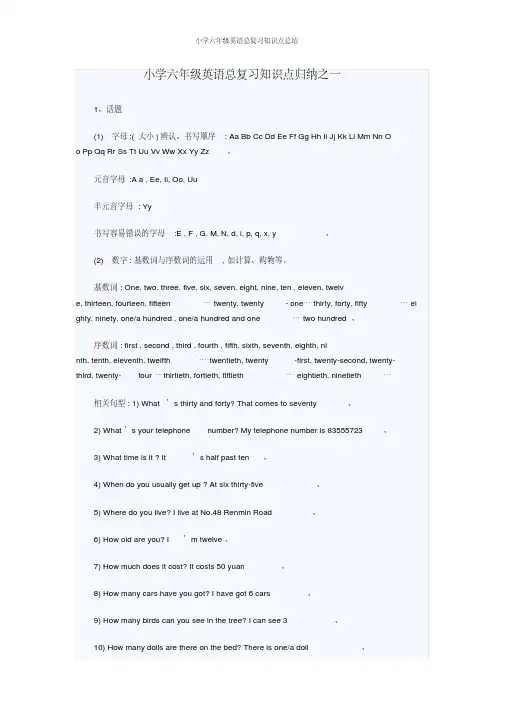
小学六年级英语总复习知识点归纳之一1、话题(1) 字母:(大小)辨认、书写顺序 : Aa Bb Cc Dd Ee Ff Gg Hh Ii Jj Kk Ll Mm Nn Oo Pp Qq Rr Ss Tt Uu Vv Ww Xx Yy Zz、元音字母:A a , Ee, Ii, Oo, Uu半元音字母: Yy书写容易错误的字母:E , F , G, M, N, d, i, p, q, x, y、(2) 数字:基数词与序数词的运用,如计算、购物等、基数词: One, two, three, five, six, seven, eight, nine, ten , eleven, twelve, thirteen, fourteen, fifteen… twenty, twenty-one… thirty, forty, fifty… ei ghty, ninety, one/a hundred , one/a hundred and one… two hundred、序数词: first , second , third , fourth , fifth, sixth, seventh, eighth, ninth, tenth, eleventh, twelfth… twentieth, twenty-first, twenty-second, twenty-third, twenty-four…thirtieth, fortieth, fiftieth… eightieth, ninetieth…相关句型: 1) What’s thirty and forty? That comes to seventy、2) What’s your telephone number? My telephone number is 83555723、3) What time is it ? It’s half past ten、4) When do you usually get up ? At six thirty-five、5) Where do you live? I live at No.48 Renmin Road、6) How old are you? I’m twelve、7) How much does it cost? It costs 50 yuan、8) How many cars have you got? I have got 6 cars、9) How many birds can you see in the tree? I can see 3、10) How many dolls are there on the bed? There is one/a doll、11) How many dolls are there on the bed? There are four dolls、12) Which floor do you live on? I live on the fifth floor、13) Excuse me, can you tell me the way to Baiyun hotel?Yes, go down this street, then turn left at the third crossing…、14) Who’s the fifth girl from the right? She’s my cousin、注意: 数词的应用; 不可数名词及它的量的表示方法;many与much在用法上的区别;th ere is/are与have/has在用法上的区别、(3)颜色:实物的颜色colours: red, pink, yellow, brown, blue, purple, orange, black, white, grey,dark blue, light blue、相关句型: 1) What colour is your coat? It’s 、、、2) What’s your favourite colour? My favourite colour is …(4)时间:年、季节、月、星期、日、时刻year, season( spring, summer, autumn, winter) ,month: January, February, March, April, May, June, July, August, September,October, November, December、Week: Sunday, Monday, Tuesday, Wednesday, Thursday, Friday, Saturday、Day: 1st May (the first of May), May 2nd ( May the second)Time: (an) hour, minute, second10:05 (five minutes past ten, ten o five)10:10 (ten minutes past ten, ten ten)10:15 (quarter past ten, ten fifteen)10:30 (half past ten, ten thirty)10:45 (quarter to eleven, ten forty-five)11:00 (eleven o’clock)相关句型: 1) How old is your mother? She’s thirty-six years old、2) How many months are there in a year? There are 12、3) When’s your birthday? My birthday is o n 15th January ( the fifteenth of January)、4) When do you get up? I get up at six o’clock、5) When does spring last? It lasts for 3 months from March to May、6) What time is it? It’s quarter to nine、(话题5-8)(5)食品与饮料:人对食品与饮料的喜好;东西方食品food : meat, rice, fish, bread, egg, cake,drinks : water, milk ,orange/apple/water melon/banana/strawberry juice ,coke, coffee, black/green tea…相关句型: 1) Would you like something to drink/eat? Yes, I’d like some…No, thanks 、2) Would you like to eat/drink? I’d like to eat/drink…No, thanks 、3) What’s your favourite food/drink? My favourite food/drink is …4) Could I have some…? Yes, please 、(6)服装:服装的颜色:人对服装的喜好;某人的穿戴;所属关系clothes: hat, cap, coat, shirt , T-shirt, skirt, dress, sweater, jacket, trousers, sock, shoeput on, wear所属关系: 形容词性的物主代词:my, your, his, her, its, our, their名词性的物主代词: mine, yours, his, hers, its, ours, theirs相关句型: 1) What does it look like? It likes wearing a blue shirt、2) Whose shoes are these? They’re mine、They’re Tom’s 、3) Is this /that/it your book? Yes, it is、No, it isn’t、4) Is this pencil yours? Yes, it is、No, it isn’t、5) Are these /those/they your coats and trousers?Yes, they are、No, they aren’t、6) Are those clothes theirs? Yes, they are、No, they aren’t、7) This is my hat、 That hat is his、注意: 名词单,复数;物主代词(名词性的物主代词,形容词性的物主代词);名词所有格,如:Tom’s , my father’s , the teachers’、(7)玩具与文具:特点、颜色、所属关系;存在的位置Toys: doll, toy…文具: desk, book, bag ,pen, pencil, pencil-box, ruler, chair, ball存在的位置 : in, on, under, beside, behind, in front of, in the front of ,in the middle of, at the back of…(a place/a person)、相关句型: 1) There is a cup of tea on the table、2) There are some oranges in the fridge、3) Is there any milk in the glass? Yes, there is、No, there isn’t、4) Are there any oranges in the fridges?Yes, there are、No, there aren’t、5) What’s under the desk?There is an orange、 / There are some oranges、(8)日常生活用品:特点、颜色、所属关系;存在的位置words: shelf, table, clock, brush, telephone, light, computer, bike, fridge,glass, knife, keyboard, bottle, box, plate, photo, photograph, fax, radio, super-market,book store,noodles/cake/clothes/shoe/TV shop、特点: big, small, heavy, light, white, black, empty, full, old, new, beautiful, cu te, tall, short, strong, plump, nice, good, bad…小学六年级英语总复习知识点归纳之三(话题9-12)(9)动物:家畜、家禽;农场动物、动物园及野生动物的特点;生活地点与所属关系words(animals): cat, dog, duck, goose (geese) fish, sheep, bird, panda, monkey, rabbit, hen , cock, chicken, tiger, lion, pig, cow , mouse (mice),giraffe,dolphin,生活地点:at home, in a farm, in a zoo …所属关系:同上话题(7)(10)植物:特点、所属关系;存在的位置words: tree, rose, flower, leaf(leaves) …(11)环境与建筑:特点、所属关系;存在的位置buildings: factory, hospital, park, house, library, museum, office, farm, post office, bank, police station, train station, sports stadium, department store, store, school, classroom, house: bathroom, living-room, sitting-room, bedroom, washroom,kitchen, garden…房子的基本构造: door, gate, wall, window, floor…相关句型: 1) Where do you study at ? I study at Longdong Primary School、2) Where does your mother work at ? She works at a hospital、3) Let’s meet at the gate of the park、4) My brother is playing in the garden、(12)身体:特点body: head, hair, eye, nose, ear, mouth, neck, shoulder, hand, finger, foot(feet) ,toe…外貌: fat, thin, plump , tall, short, old, young, round face, two big blueeyes, long hair, short hair, black hair ,white hair…相关句型: 1) I’m /You’re /He’s/She’s /We’re /They’re (not) tall、2) Is he/she tall or short? He’s /She’s tall (short)、3) I/We/They/You have (got) black hair、4) He/She has ( got ) a round face、5) Has he/she got long hair ? Yes, he/she has、No, he/she hasn’t、注意:描述人的外貌时,have与has用法上的区别; 形容词的用法,如 :tall, short, o ld, young, black , long…小学六年级英语总复习知识点归纳之四(话题13-16)(13)个人情况:姓名、年龄、地址、特点与爱好age, year, address, e-mail address, hobby,hobby: collecting stamps(coins) , going swimming… doing sth相关句型: 1) How old are you ? I’m thirteen years old、2) I’m a thirteen-year old boy、3) W hat’s your address? I live at No、48 Renmin road、4) What’s your e-mail address? My e-mail address is 123VIP@126、com、5) What’s your hobby? My hobby is going running、Or : I like going running、6) I /You/ They like music、7) He likes sightseeing、8) Do you like reading? Yes, I do、No, I don’t、9) Does he /she like playing basketball?Yes, he/she does、No, he/she doesn’t、注意: 描述个人的喜好时:名词与动词- ing 形式作宾语; 主语就是第三人称单数时一般现在时动词的变化。
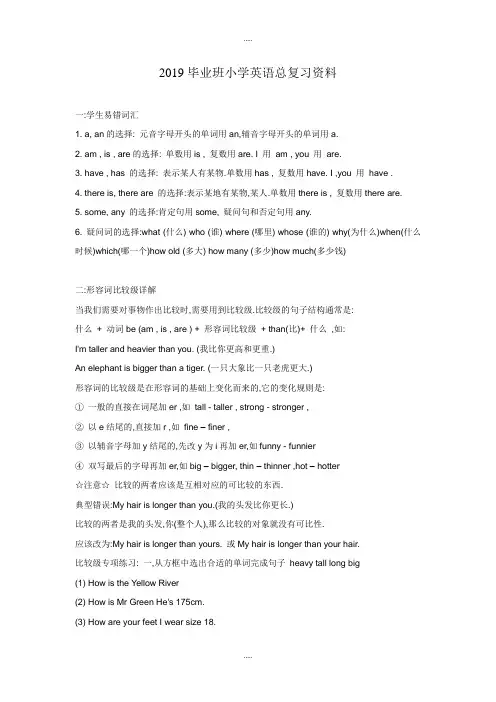
2019毕业班小学英语总复习资料一:学生易错词汇1. a, an的选择: 元音字母开头的单词用an,辅音字母开头的单词用a.2. am , is , are的选择: 单数用is , 复数用are. I 用am , you 用are.3. have , has 的选择: 表示某人有某物.单数用has , 复数用have. I ,you 用have .4. there is, there are 的选择:表示某地有某物,某人.单数用there is , 复数用there are.5. some, any 的选择:肯定句用some, 疑问句和否定句用any.6. 疑问词的选择:what (什么) who (谁) where (哪里) whose (谁的) why(为什么)when(什么时候)which(哪一个)how old (多大) how many (多少)how much(多少钱)二:形容词比较级详解当我们需要对事物作出比较时,需要用到比较级.比较级的句子结构通常是:什么+ 动词be (am , is , are ) + 形容词比较级+ than(比)+ 什么,如:I'm taller and heavier than you. (我比你更高和更重.)An elephant is bigger than a tiger. (一只大象比一只老虎更大.)形容词的比较级是在形容词的基础上变化而来的,它的变化规则是:①一般的直接在词尾加er ,如tall - taller , strong - stronger ,②以e结尾的,直接加r ,如fine – finer ,③以辅音字母加y结尾的,先改y为i再加er,如funny - funnier④双写最后的字母再加er,如big – bigger, thin – thinner ,hot – hotter☆注意☆比较的两者应该是互相对应的可比较的东西.典型错误:My hair is longer than you.(我的头发比你更长.)比较的两者是我的头发,你(整个人),那么比较的对象就没有可比性.应该改为:My hair is longer than yours. 或My hair is longer than your hair.比较级专项练习: 一,从方框中选出合适的单词完成句子heavy tall long big(1) How is the Yellow River(2) How is Mr Green He's 175cm.(3) How are your feet I wear size 18.(4)How is the fish It's 2kg.三:动词过去式详解动词的过去式的构成规则有:A,规则动词①一般直接在动词的后面加ed:如worked , learned , cleaned , visited②以e结尾的动词直接加d:如lived , danced , used③以辅音字母加y结尾的动词要改y为i再加ed(此类动词较少)如study – studied carry –carried worry – worried (注意play,stay不是辅音字母加y,所以不属于此类)④双写最后一个字母(此类动词较少)如stoppedB,不规则动词(此类词并无规则,须熟记)小学阶段要记住以下动词的原形和过去式:sing –sang , eat – ate , see – saw , have – had , do – did , go - went , take - took , buy - bought , get - got , read - read ,fly - flew , am/is - was ,are - were , say - said , leave - left , swim - swam , tell - told , draw - drew , come - came , lose - lost , find - found , drink - drank , hurt - hurt , feel - felt四:动词现在分词详解动词的ing形式的构成规则:①一般的直接在后面加上ing , 如doing , going , working , singing , eating②以e 结尾的动词,要先去e再加ing ,如having , writing③双写最后一个字母的(此类动词极少)有:running , swimming , sitting , getting五:人称代词与物主代词一、人称代词二、物主代词六:句型专项归类1.肯定句:是指用肯定的语气来陈述的句子,如:I'm a student. She is a doctor. He works in a hospital.There are four fans in our classroom. He will eat lunch at 12:00. I watched TV yesterday evening.2,否定句:含有否定词或表示否定意义词的句子,如:I'm not a student. She is not (isn't) a doctor.He does not (doesn't) work in a hospital. There are not (aren't) four fans in our classroom. He will not (won't) eat lunch at 12:00. I did not (didn't) watch TV yesterday evening.☆注意☆小结:否定句主要是在肯定句的基础上加上了否定词"not".有动词be的句子则"not"加在be后面,可缩写成"isn't,aren't",但am not 一般都分开写.没有动词be的句子则要先在主要动词的前面加上一个助动词(do,does,did),然后在它后面加上"not",你也可以把它们缩写在一起如"don't , doesn't , didn't ).这三个助动词要根据人称和时态来选择,其中"does"只用于一般现在时主语是第三人称单数的情况,而"did"只用于一般过去时,不论主语是什么人称和数,都用"did" .3,一般疑问句:是指询问事实的句子,此类句子必须用"yes",或"no"来回答.如:Are you a student Yes, I am / No, I'm not.Is she a doctor Yes, she is. / No, she isn't.Does he work in a hospital Yes, he does. / No, he doesn't.Are there four fans in our classroom Yes, there are. / No, there aren't.Are you going to buy a comic book tonight Yes, I am. / No, I am not. (Yes, we are. / No, we aren't.)Will he eat lunch at 12:00 Yes, I will. / No, I will not(won't).Are they swimming Yes, they are. / No, they aren't.Did you watch TV yesterday evening Yes, I did. / No, I didn't.☆注意☆小结:一般疑问句是在肯定句的基础上,①把动词be调到首位,其他照写,末尾标点符号变成问号即可.②没有动词be的句子则要在句首加上一个助动词(do,does,did)再把紧跟在后面的动词变回原形,末尾标点符号变成问号即可.这三个助动词也要根据人称和时态来选择,其中"does"只用于一般现在时主语是第三人称单数的情况,而"did"只用于一般过去时,不论主语是什么人称和数,都用"did" .一般疑问句有个重要的原则就是问和答要一致,即问句里的第一个单词(助动词)和简略答句里的这个词是一致的.4,特殊疑问句:以特殊疑问词(what , where , who , which , when , whose , why , how等)开头引导的句子.此类句子应该问什么就答什么,不能用"yes ,no"来回答.如:What is this It's a computer.What does he do He's a doctor.Where are you going I'm going to Beijing.Who played football with you yesterday afternoon Mike.Which season do you like best Summer.When do you usually get up I usually get up at 6:30.Whose skirt is this It's Amy's.Why do you like spring best Because I can plant trees.How are you I'm fine. / I'm happy.How did you go to Xinjiang I went to Xinjiang by train.☆其中how又可以和其他一些形容词连用组成特殊疑问词组用来提问,如: how many(多少(数量)), how much(多少(钱)), how tall(多高), how long(多长), how big(多大), how heavy(多重)例句:How many pencils do you have I have three pencils.How many girls can you see I can see four girls.How many desks are there in your classroom There are 51.☆小结:how many 用来提问可数名词的数量,主要有以上三种句式搭配,How many + 名词复数+ do you have 你有多少……How many + 名词复数+ can you see 你能看见多少……How many + 名词复数+ are there… 有多少……七:完全,缩略形式: I'm=I am he's=he is she's=she is they're=they are you're=you are there's=there is they're=they are can't=can not don't=do not doesn't=does not isn't=is not aren't=are not let's=let us won't=will not I'll=I will wasn't=was not总结:通常情况下,'m即am,'s即is(但let's=let us), 're即are ,n't即not (但can't=can not)八:小学英语词汇不完全归类表学习用品(school things):pen钢笔pencil铅笔pencil-case铅笔盒ruler尺子book书bag 包comic book漫画书post card明信片newspaper报纸schoolbag书包eraser橡皮crayon蜡笔sharpener卷笔刀story-book故事书notebook笔记本Chinese book语文书English book英语书math book数学书magazine杂志dictionary词典人体(body):foot脚head头face脸hair头发nose鼻子mouth嘴eye眼睛ear耳朵arm 手臂hand手finger手指leg腿tail尾巴颜色(colours):red红blue蓝yellow黄green绿white白black黑pink粉红purple紫orange橙brown棕动物(animals):cat猫dog狗pig猪duck鸭rabbit兔horse马elephant大象ant蚂蚁fish鱼bird鸟eagle鹰beaver海狸snake蛇mouse老鼠squirrel松鼠kangaroo袋鼠monkey猴panda熊猫bear熊lion狮子tiger老虎fox狐狸zebra斑马deer鹿giraffe 长颈鹿goose鹅hen母鸡turkey火鸡lamb小羊sheep绵羊goat山羊cow奶牛donkey驴squid鱿鱼lobster龙虾shark鲨鱼seal海豹sperm whale抹香鲸killer whale 虎鲸人物(people):friend朋友boy男孩girl女孩mother母亲father父亲sister姐妹brother 兄弟uncle叔叔;舅舅man男人woman女人Mr.先生Miss小姐lady女士;小姐mom妈妈dad爸爸parents父母grandparents祖父母grandma/grandmother(外)祖母grandpa/grandfather(外)祖父aunt姑姑cousin堂(表)兄弟;堂(表)姐妹son儿子daughter 女儿baby婴儿kid小孩classmate同学queen女王visitor参观者neighbour邻居principal校长university student大学生pen pal笔友tourist旅行者people人物robot机器人职业(jobs):teacher教师student学生doctor医生nurse护士driver司机farmer农民singer歌唱家writer作家actor男演员actress女演员artist画家TV reporter电视台记者engineer工程师accountant会计policeman(男)警察salesperson销售员cleaner清洁工baseball player棒球运动员assistant售货员police警察食品,饮料(food & drink):rice米饭bread面包beef牛肉milk牛奶water水egg蛋fish鱼tofu豆腐cake蛋糕hot dog热狗hamburger汉堡包French fries炸薯条cookie曲奇biscuit饼干jam果酱noodles面条meat肉chicken鸡肉pork猪肉mutton羊肉vegetable蔬菜salad沙拉soup汤ice冰ice-cream冰淇淋Coke可乐juice果汁tea茶coffee咖啡breakfast早餐lunch午餐dinner/supper晚餐meal一餐水果,蔬菜(fruit & vegetables):apple苹果banana香蕉pear梨orange橙watermelon西瓜grape葡萄eggplant茄子green beans青豆tomato西红柿potato土豆peach桃strawberry草莓cucumber黄瓜onion洋葱carrot胡萝卜cabbage卷心菜衣服(clothes):jacket夹克衫shirt衬衫T-shirt丅恤衫skirt短裙子dress连衣裙jeans牛仔裤pants长裤socks袜子shoes鞋子sweater毛衣coat上衣raincoat雨衣shorts短裤sneakers网球鞋slippers拖鞋sandals凉鞋boots靴子hat(有沿的)帽子cap便帽sunglasses太阳镜tie领带scarf围巾gloves手套trousers裤子cloth布交通工具(vehicles):bike自行车bus公共汽车train火车boat小船ship轮船yacht快艇car小汽车taxi出租车jeep吉普车van小货车;面包车plane/airplane飞机subway/underground地铁motor cycle摩托车杂物(other things): window窗户door门desk课桌chair椅子bed床computer计算机board写字板fan风扇light灯teacher's desk讲台picture图画;照片wall墙壁floor地板curtain窗帘trash bin垃圾箱closet壁橱mirror镜子end table床头柜football/soccer足球present礼物walkman随身听lamp台灯phone电话sofa沙发shelf书架fridge冰箱table桌子TV电视air-conditioner空调key钥匙lock锁photo照片chart图表plate盘子knife刀fork叉spoon勺子chopsticks筷子pot锅gift礼物toy玩具doll洋娃娃ball 球balloon气球kite风筝jigsaw puzzle拼图游戏box盒子umbrella伞zipper拉链violin 小提琴yo-yo溜溜球nest鸟窝hole洞tube管子toothbrush牙刷menu菜单e-card电子卡片e-mail电子邮件traffic light交通灯money钱medicine药地点(locations):home家room房间bedroom卧室bathroom卫生间living room起居室kitchen厨房classroom教室school学校park公园library图书馆post office邮局police office警察局hospital医院cinema电影院bookstore书店farm农场zoo动物园garden 花园study书房playground操场canteen食堂teacher's office教师办公室library图书馆gym体育馆washroom卫生间art room绘画教室computer room计算机教室music room 音乐教室TV room电视机房flat公寓company公司factory工厂fruit stand水果摊pet shop宠物商店nature park自然公园theme park主题公园science museum科学博物馆the Great Wall长城supermarket超市bank银行country国家village乡村city城市hometown家乡bus stop公交车站课程(classes): sports体育运动science科学Moral Education思想品德课Social Studies 社会课Chinese语文math数学PE体育课English英语课国家,城市(countries & cities): China/PRC中国America/USA美国UK联合王国England 英国Canada/CAN加拿大Australia澳大利亚New York纽约London伦敦Sydney悉尼Moscow莫斯科Cairo开罗气象(weather): cold寒冷的warm温暖的cool凉爽的snowy下雪的sunny晴朗的hot炎热的rainy下雨的windy有风的cloudy多云的weather report天气预报景物(nature): river河流lake湖泊stream河;溪forest森林path小道road公路house 房子bridge桥building建筑物rain雨cloud云sun太阳mountain山sky天空rainbow 彩虹wind风air空气moon月亮植物(plants): flower花grass草tree树seed种子sprout苗plant植物rose玫瑰leaf 叶子星期(week): Monday星期一Tuesday星期二Wednesday星期三Thursday星期四Friday星期五Saturday星期六Sunday星期天weekend周末月份(months): Jan. (January)一月Feb.(February)二月Mar.(March)三月April四月May 五月June六月July七月Aug.(August)八月Sept.(September)九月Oct.(October)十月Nov.(November)十一月Dec.(December)十二月季节(seasons): spring春summer夏fall/autumn秋winter冬方位(directions): south南north北east东west西left 左边right右边患病(illness): have a fever发烧hurt疼痛have a cold感冒have a toothache牙疼have a headache头疼have a sore throat喉咙疼数词(numbers): one一two二three三four四five五six六seven七eight八nine九ten十eleven十一twelve十二thirteen十三fourteen十四fifteen十五sixteen十六seventeen十七eighteen十八nineteen十九twenty二十thirty三十forty四十fifty五十sixty六十seventy七十eighty八十ninety九十forty-two四十二hundred百one/a hundred and thirty-six一百三十六first第一second第二third第三fourth第四fifth第五eighth第八ninth第九twelfth第十二twentieth第二十thirtieth第三十fortieth第四十fiftieth第五十sixtieth第六十seventieth第七十eightieth第八十ninetieth第九十fifty-sixth第五十六形容词(adj.): big大的small小的long长的tall高的short短的;矮的young年轻的old 旧的;老的strong健壮的thin瘦的active积极活跃的quiet安静的nice好看的kind和蔼亲切的strict严格的smart聪明的funny滑稽可笑的tasty好吃的sweet甜的salty咸的sour酸的fresh新鲜的favourite最喜爱的clean干净的tired疲劳的excited兴奋的angry生气的happy高兴的bored无聊的sad忧愁的taller更高的shorter更矮的stronger更强壮的older年龄更大的younger更年轻的bigger更大的heavier更重的longer更长的thinner更瘦的smaller更小的good好的fine好的great很好的heavy 重的new新的fat胖的happy快乐的right对的hungry饥饿的cute逗人喜爱的little小的lovely可爱的beautiful漂亮的colourful色彩鲜艳的pretty漂亮的cheap便宜的expensive昂贵的juicy多汁的tender嫩的healthy健康的ill有病的helpful有帮助的high高的easy简单的proud骄傲的sick有病的better更好的higher更高的介词(prep.): in在……里on在……上;在……时候under在……下面near在……的旁边behind在……后边next to与……相邻over在……上面in front of在……前面代词(pron.): I我we我们you你;你们he他she她it它they他(她,它)们my我的our 我们的your你的;你们的his他的her她的动词(v.):play(.ed)玩;踢swim(swam)游泳skate滑冰fly(flew)飞jump跳walk走run(ran)跑climb爬fight(fought)打架swing(swung)荡eat(ate)吃sleep(slept)睡觉like像,喜欢have(had)有;吃turn转弯buy(bought)买take(took)买;带live居住teach(taught)教go(went)去study(studied)学习learn学习sing(sang)唱歌dance跳舞row划do(did)做do homework做作业do housework做家务watch TV看电视read(read) books读书cook the meals做饭water the flowers浇花sweep(swept) the floor扫地clean the bedroom打扫卧室make(made) the bed铺床set(set) the table摆饭桌wash the clothes洗衣服do the dishes洗碗碟use a computer使用计算机do morning exercises晨练;做广播操eat breakfast吃早饭eat dinner吃晚饭go to school上学have English class上英语课play sports进行体育运动get(got)up起床climb mountains爬山go shopping买东西play the piano弹钢琴visit grandparents看望(外)祖父母go hiking去远足fly kites放风筝make a snowman堆雪人plant trees种树draw(drew) pictures画画cook dinner做饭read a book 看书answer the phone接电话listen to music听音乐clean the room打扫房间write(wrote) a letter写信write an e-mail写电子邮件drink(drank) water喝水take pictures 照相watch insects观察昆虫pick up leaves采摘树叶do an experiment做实验catch butterflies捉蝴蝶count insects数昆虫collect insects收集昆虫collect leaves收集树叶write a report写报告play chess下棋have a picnic举行野餐get to到达ride(rode) a bike 骑自行车play the violin拉小提琴make kites制作风筝collect stamps集邮meet(met)见面welcome欢迎thank谢谢love爱work工作drink(drank)喝taste尝smell闻feed(fed)喂养shear剪milk挤奶look看guess猜help帮助pass传递show展示use 使用clean打扫open打开close关上put放paint绘画tell(told)告诉kick踢bounce反弹ride(rode)骑stop(stopped)停wait等find(found)寻找到drive(drove)驾驶fold折send(sent)寄wash洗shine照耀become变成feel(felt)感觉到think(thought)思考meet(met)遇见fall(fell)落下leave(left)离开wake(woke) up醒来put on穿上take off脱掉hang up挂起wear(wore)穿go home回家go to bed上床睡觉play computer games 玩电脑游戏play chess下棋empty the trash倒垃圾put away the clothes收拾衣服get off下车take a trip去旅行read a magazine读杂志go to the cinema去看电影go straight 向前直走2009毕业班小学英语总复习资料一:学生易错词汇1. a, an的选择: 元音字母开头的单词用an,辅音字母开头的单词用a.2. am , is , are的选择: 单数用is , 复数用are. I 用am , you 用are.3. have , has 的选择: 表示某人有某物.单数用has , 复数用have. I ,you 用have .4. there is, there are 的选择:表示某地有某物,某人.单数用there is , 复数用there are.5. some, any 的选择:肯定句用some, 疑问句和否定句用any.6. 疑问词的选择:what (什么) who (谁) where (哪里) whose (谁的) why(为什么)when(什么时候)which(哪一个)how old (多大) how many (多少)how much(多少钱)二:形容词比较级详解当我们需要对事物作出比较时,需要用到比较级.比较级的句子结构通常是:什么+ 动词be (am , is , are ) + 形容词比较级+ than(比)+ 什么,如:I'm taller and heavier than you. (我比你更高和更重.)An elephant is bigger than a tiger. (一只大象比一只老虎更大.)形容词的比较级是在形容词的基础上变化而来的,它的变化规则是:①一般的直接在词尾加er ,如tall - taller , strong - stronger ,②以e结尾的,直接加r ,如fine – finer ,③以辅音字母加y结尾的,先改y为i再加er,如funny - funnier④双写最后的字母再加er,如big – bigger, thin – thinner ,hot – hotter☆注意☆比较的两者应该是互相对应的可比较的东西.典型错误:My hair is longer than you.(我的头发比你更长.)比较的两者是我的头发,你(整个人),那么比较的对象就没有可比性.应该改为:My hair is longer than yours. 或My hair is longer than your hair.比较级专项练习: 一,从方框中选出合适的单词完成句子heavy tall long big(1) How is the Yellow River(2) How is Mr Green He's 175cm.(3) How are your feet I wear size 18.(4)How is the fish It's 2kg.三:动词过去式详解动词的过去式的构成规则有:A,规则动词①一般直接在动词的后面加ed:如worked , learned , cleaned , visited②以e结尾的动词直接加d:如lived , danced , used③以辅音字母加y结尾的动词要改y为i再加ed(此类动词较少)如study – studied carry –carried worry – worried (注意play,stay不是辅音字母加y,所以不属于此类)④双写最后一个字母(此类动词较少)如stoppedB,不规则动词(此类词并无规则,须熟记)小学阶段要记住以下动词的原形和过去式:sing –sang , eat – ate , see – saw , have – had , do – did , go - went , take - took , buy - bought , get - got , read - read ,fly - flew , am/is - was ,are - were , say - said , leave - left , swim - swam , tell - told , draw - drew , come - came , lose - lost , find - found , drink - drank , hurt - hurt , feel - felt四:动词现在分词详解动词的ing形式的构成规则:①一般的直接在后面加上ing , 如doing , going , working , singing , eating②以e 结尾的动词,要先去e再加ing ,如having , writing③双写最后一个字母的(此类动词极少)有:running , swimming , sitting , getting五:人称代词与物主代词一、人称代词二、物主代词六:句型专项归类1.肯定句:是指用肯定的语气来陈述的句子,如:I'm a student. She is a doctor. He works in a hospital.There are four fans in our classroom. He will eat lunch at 12:00. I watched TV yesterday evening.2,否定句:含有否定词或表示否定意义词的句子,如:I'm not a student. She is not (isn't) a doctor.He does not (doesn't) work in a hospital. There are not (aren't) four fans in our classroom. He will not (won't) eat lunch at 12:00. I did not (didn't) watch TV yesterday evening.☆注意☆小结:否定句主要是在肯定句的基础上加上了否定词"not".有动词be的句子则"not"加在be后面,可缩写成"isn't,aren't",但am not 一般都分开写.没有动词be的句子则要先在主要动词的前面加上一个助动词(do,does,did),然后在它后面加上"not",你也可以把它们缩写在一起如"don't , doesn't , didn't ).这三个助动词要根据人称和时态来选择,其中"does"只用于一般现在时主语是第三人称单数的情况,而"did"只用于一般过去时,不论主语是什么人称和数,都用"did" .3,一般疑问句:是指询问事实的句子,此类句子必须用"yes",或"no"来回答.如:Are you a student Yes, I am / No, I'm not.Is she a doctor Yes, she is. / No, she isn't.Does he work in a hospital Yes, he does. / No, he doesn't.Are there four fans in our classroom Yes, there are. / No, there aren't.Are you going to buy a comic book tonight Yes, I am. / No, I am not. (Yes, we are. / No, we aren't.)Will he eat lunch at 12:00 Yes, I will. / No, I will not(won't).Are they swimming Yes, they are. / No, they aren't.Did you watch TV yesterday evening Yes, I did. / No, I didn't.☆注意☆小结:一般疑问句是在肯定句的基础上,①把动词be调到首位,其他照写,末尾标点符号变成问号即可.②没有动词be的句子则要在句首加上一个助动词(do,does,did)再把紧跟在后面的动词变回原形,末尾标点符号变成问号即可.这三个助动词也要根据人称和时态来选择,其中"does"只用于一般现在时主语是第三人称单数的情况,而"did"只用于一般过去时,不论主语是什么人称和数,都用"did" .一般疑问句有个重要的原则就是问和答要一致,即问句里的第一个单词(助动词)和简略答句里的这个词是一致的.4,特殊疑问句:以特殊疑问词(what , where , who , which , when , whose , why , how等)开头引导的句子.此类句子应该问什么就答什么,不能用"yes ,no"来回答.如:What is this It's a computer.What does he do He's a doctor.Where are you going I'm going to Beijing.Who played football with you yesterday afternoon Mike.Which season do you like best Summer.When do you usually get up I usually get up at 6:30.Whose skirt is this It's Amy's.Why do you like spring best Because I can plant trees.How are you I'm fine. / I'm happy.How did you go to Xinjiang I went to Xinjiang by train.☆其中how又可以和其他一些形容词连用组成特殊疑问词组用来提问,如: how many(多少(数量)), how much(多少(钱)), how tall(多高), how long(多长), how big(多大), how heavy(多重)例句:How many pencils do you have I have three pencils.How many girls can you see I can see four girls.How many desks are there in your classroom There are 51.☆小结:how many 用来提问可数名词的数量,主要有以上三种句式搭配,How many + 名词复数+ do you have 你有多少……How many + 名词复数+ can you see 你能看见多少……How many + 名词复数+ are there… 有多少……七:完全,缩略形式: I'm=I am he's=he is she's=she is they're=they are you're=you are there's=there is they're=they are can't=can not don't=do not doesn't=does not isn't=is not aren't=are not let's=let us won't=will not I'll=I will wasn't=was not总结:通常情况下,'m即am,'s即is(但let's=let us), 're即are ,n't即not (但can't=can not)八:小学英语词汇不完全归类表学习用品(school things):pen钢笔pencil铅笔pencil-case铅笔盒ruler尺子book书bag 包comic book漫画书post card明信片newspaper报纸schoolbag书包eraser橡皮crayon蜡笔sharpener卷笔刀story-book故事书notebook笔记本Chinese book语文书English book英语书math book数学书magazine杂志dictionary词典人体(body):foot脚head头face脸hair头发nose鼻子mouth嘴eye眼睛ear耳朵arm 手臂hand手finger手指leg腿tail尾巴颜色(colours):red红blue蓝yellow黄green绿white白black黑pink粉红purple紫orange橙brown棕动物(animals):cat猫dog狗pig猪duck鸭rabbit兔horse马elephant大象ant蚂蚁fish鱼bird鸟eagle鹰beaver海狸snake蛇mouse老鼠squirrel松鼠kangaroo袋鼠monkey猴panda熊猫bear熊lion狮子tiger老虎fox狐狸zebra斑马deer鹿giraffe 长颈鹿goose鹅hen母鸡turkey火鸡lamb小羊sheep绵羊goat山羊cow奶牛donkey驴squid鱿鱼lobster龙虾shark鲨鱼seal海豹sperm whale抹香鲸killer whale 虎鲸人物(people):friend朋友boy男孩girl女孩mother母亲father父亲sister姐妹brother 兄弟uncle叔叔;舅舅man男人woman女人Mr.先生Miss小姐lady女士;小姐mom妈妈dad爸爸parents父母grandparents祖父母grandma/grandmother(外)祖母grandpa/grandfather(外)祖父aunt姑姑cousin堂(表)兄弟;堂(表)姐妹son儿子daughter 女儿baby婴儿kid小孩classmate同学queen女王visitor参观者neighbour邻居principal校长university student大学生pen pal笔友tourist旅行者people人物robot机器人职业(jobs):teacher教师student学生doctor医生nurse护士driver司机farmer农民singer歌唱家writer作家actor男演员actress女演员artist画家TV reporter电视台记者engineer工程师accountant会计policeman(男)警察salesperson销售员cleaner清洁工baseball player棒球运动员assistant售货员police警察食品,饮料(food & drink):rice米饭bread面包beef牛肉milk牛奶water水egg蛋fish鱼tofu豆腐cake蛋糕hot dog热狗hamburger汉堡包French fries炸薯条cookie曲奇biscuit饼干jam果酱noodles面条meat肉chicken鸡肉pork猪肉mutton羊肉vegetable蔬菜salad沙拉soup汤ice冰ice-cream冰淇淋Coke可乐juice果汁tea茶coffee咖啡breakfast早餐lunch午餐dinner/supper晚餐meal一餐水果,蔬菜(fruit & vegetables):apple苹果banana香蕉pear梨orange橙watermelon西瓜grape葡萄eggplant茄子green beans青豆tomato西红柿potato土豆peach桃strawberry草莓cucumber黄瓜onion洋葱carrot胡萝卜cabbage卷心菜衣服(clothes):jacket夹克衫shirt衬衫T-shirt丅恤衫skirt短裙子dress连衣裙jeans牛仔裤pants长裤socks袜子shoes鞋子sweater毛衣coat上衣raincoat雨衣shorts短裤sneakers网球鞋slippers拖鞋sandals凉鞋boots靴子hat(有沿的)帽子cap便帽sunglasses太阳镜tie领带scarf围巾gloves手套trousers裤子cloth布交通工具(vehicles):bike自行车bus公共汽车train火车boat小船ship轮船yacht快艇car小汽车taxi出租车jeep吉普车van小货车;面包车plane/airplane飞机subway/underground地铁motor cycle摩托车杂物(other things): window窗户door门desk课桌chair椅子bed床computer计算机board写字板fan风扇light灯teacher's desk讲台picture图画;照片wall墙壁floor地板curtain窗帘trash bin垃圾箱closet壁橱mirror镜子end table床头柜football/soccer足球present礼物walkman随身听lamp台灯phone电话sofa沙发shelf书架fridge冰箱table桌子TV电视air-conditioner空调key钥匙lock锁photo照片chart图表plate盘子knife刀fork叉spoon勺子chopsticks筷子pot锅gift礼物toy玩具doll洋娃娃ball 球balloon气球kite风筝jigsaw puzzle拼图游戏box盒子umbrella伞zipper拉链violin 小提琴yo-yo溜溜球nest鸟窝hole洞tube管子toothbrush牙刷menu菜单e-card电子卡片e-mail电子邮件traffic light交通灯money钱medicine药地点(locations):home家room房间bedroom卧室bathroom卫生间living room起居室kitchen厨房classroom教室school学校park公园library图书馆post office邮局police office警察局hospital医院cinema电影院bookstore书店farm农场zoo动物园garden 花园study书房playground操场canteen食堂teacher's office教师办公室library图书馆gym体育馆washroom卫生间art room绘画教室computer room计算机教室music room 音乐教室TV room电视机房flat公寓company公司factory工厂fruit stand水果摊pet shop宠物商店nature park自然公园theme park主题公园science museum科学博物馆the Great Wall长城supermarket超市bank银行country国家village乡村city城市hometown家乡bus stop公交车站课程(classes): sports体育运动science科学Moral Education思想品德课Social Studies 社会课Chinese语文math数学PE体育课English英语课国家,城市(countries & cities): China/PRC中国America/USA美国UK联合王国England 英国Canada/CAN加拿大Australia澳大利亚New York纽约London伦敦Sydney悉尼Moscow莫斯科Cairo开罗气象(weather): cold寒冷的warm温暖的cool凉爽的snowy下雪的sunny晴朗的hot炎热的rainy下雨的windy有风的cloudy多云的weather report天气预报景物(nature): river河流lake湖泊stream河;溪forest森林path小道road公路house 房子bridge桥building建筑物rain雨cloud云sun太阳mountain山sky天空rainbow 彩虹wind风air空气moon月亮植物(plants): flower花grass草tree树seed种子sprout苗plant植物rose玫瑰leaf 叶子星期(week): Monday星期一Tuesday星期二Wednesday星期三Thursday星期四Friday星期五Saturday星期六Sunday星期天weekend周末月份(months): Jan. (January)一月Feb.(February)二月Mar.(March)三月April四月May 五月June六月July七月Aug.(August)八月Sept.(September)九月Oct.(October)十月Nov.(November)十一月Dec.(December)十二月季节(seasons): spring春summer夏fall/autumn秋winter冬方位(directions): south南north北east东west西left 左边right右边患病(illness): have a fever发烧hurt疼痛have a cold感冒have a toothache牙疼have a headache头疼have a sore throat喉咙疼数词(numbers): one一two二three三four四five五six六seven七eight八nine九ten十eleven十一twelve十二thirteen十三fourteen十四fifteen十五sixteen十六seventeen十七eighteen十八nineteen十九twenty二十thirty三十forty四十fifty五十sixty六十seventy七十eighty八十ninety九十forty-two四十二hundred百one/a hundred and thirty-six一百三十六first第一second第二third第三fourth第四fifth第五eighth第八ninth第九twelfth第十二twentieth第二十thirtieth第三十fortieth第四十fiftieth第五十sixtieth第六十seventieth第七十eightieth第八十ninetieth第九十fifty-sixth第五十六形容词(adj.): big大的small小的long长的tall高的short短的;矮的young年轻的old 旧的;老的strong健壮的thin瘦的active积极活跃的quiet安静的nice好看的kind和蔼亲切的strict严格的smart聪明的funny滑稽可笑的tasty好吃的sweet甜的salty咸的sour酸的fresh新鲜的favourite最喜爱的clean干净的tired疲劳的excited兴奋的angry生气的happy高兴的bored无聊的sad忧愁的taller更高的shorter更矮的stronger更强壮的older年龄更大的younger更年轻的bigger更大的heavier更重的longer更长的thinner更瘦的smaller更小的good好的fine好的great很好的heavy 重的new新的fat胖的happy快乐的right对的hungry饥饿的cute逗人喜爱的little小的lovely可爱的beautiful漂亮的colourful色彩鲜艳的pretty漂亮的cheap便宜的expensive昂贵的juicy多汁的tender嫩的healthy健康的ill有病的helpful有帮助的high高的easy简单的proud骄傲的sick有病的better更好的higher更高的介词(prep.): in在……里on在……上;在……时候under在……下面near在……的旁边behind在……后边next to与……相邻over在……上面in front of在……前面代词(pron.): I我we我们you你;你们he他she她it它they他(她,它)们my我的our 我们的your你的;你们的his他的her她的动词(v.):play(.ed)玩;踢swim(swam)游泳skate滑冰fly(flew)飞jump跳walk走run(ran)跑climb爬fight(fought)打架swing(swung)荡eat(ate)吃sleep(slept)睡觉like像,喜欢have(had)有;吃turn转弯buy(bought)买take(took)买;带live居住teach(taught)教go(went)去study(studied)学习learn学习sing(sang)唱歌dance跳舞row划do(did)做do homework做作业do housework做家务watch TV看电视read(read) books读书cook the meals做饭water the flowers浇花sweep(swept) the floor扫地clean the bedroom打扫卧室make(made) the bed铺床set(set) the table摆饭桌wash the clothes洗衣服do the dishes洗碗碟use a computer使用计算机do morning exercises晨练;做广播操eat breakfast吃早饭eat dinner吃晚饭go to school上学have English class上英语课play sports进行体育运动get(got)up起床climb mountains爬山go shopping买东西play thepiano弹钢琴visit grandparents看望(外)祖父母go hiking去远足fly kites放风筝make a snowman堆雪人plant trees种树draw(drew) pictures画画cook dinner做饭read a book 看书answer the phone接电话listen to music听音乐clean the room打扫房间write(wrote) a letter写信write an e-mail写电子邮件drink(drank) water喝水take pictures 照相watch insects观察昆虫pick up leaves采摘树叶do an experiment做实验catch butterflies捉蝴蝶count insects数昆虫collect insects收集昆虫collect leaves收集树叶write a report写报告play chess下棋have a picnic举行野餐get to到达ride(rode) a bike 骑自行车play the violin拉小提琴make kites制作风筝collect stamps集邮meet(met)见面welcome欢迎thank谢谢love爱work工作drink(drank)喝taste尝smell闻feed(fed)喂养shear剪milk挤奶look看guess猜help帮助pass传递show展示use 使用clean打扫open打开close关上put放paint绘画tell(told)告诉kick踢bounce反弹ride(rode)骑stop(stopped)停wait等find(found)寻找到drive(drove)驾驶fold折send(sent)寄wash洗shine照耀become变成feel(felt)感觉到think(thought)思考meet(met)遇见fall(fell)落下leave(left)离开wake(woke) up醒来put on穿上take off脱掉hang up挂起wear(wore)穿go home回家go to bed上床睡觉play computer games 玩电脑游戏play chess下棋empty the trash倒垃圾put away the clothes收拾衣服get off下车take a trip去旅行read a magazine读杂志go to the cinema去看电影go straight 向前直走2009毕业班小学英语总复习资料一:学生易错词汇1. a, an的选择: 元音字母开头的单词用an,辅音字母开头的单词用a.2. am , is , are的选择: 单数用is , 复数用are. I 用am , you 用are.3. have , has 的选择: 表示某人有某物.单数用has , 复数用have. I ,you 用have .4. there is, there are 的选择:表示某地有某物,某人.单数用there is , 复数用there are.5. some, any 的选择:肯定句用some, 疑问句和否定句用any.6. 疑问词的选择:what (什么) who (谁) where (哪里) whose (谁的) why(为什么)when(什么。
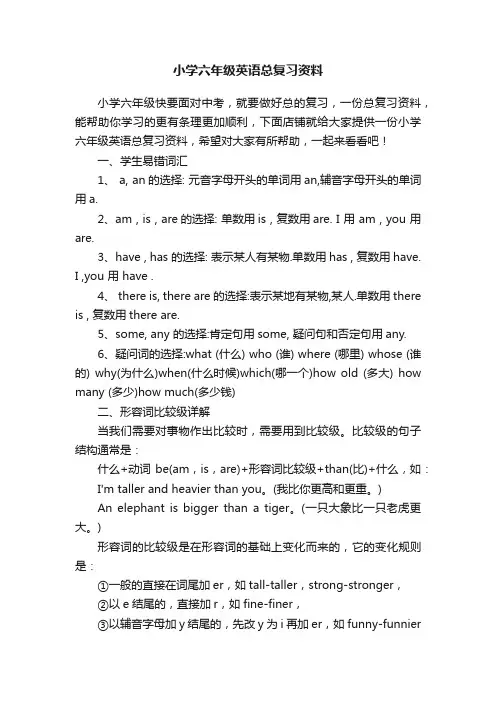
小学六年级英语总复习资料小学六年级快要面对中考,就要做好总的复习,一份总复习资料,能帮助你学习的更有条理更加顺利,下面店铺就给大家提供一份小学六年级英语总复习资料,希望对大家有所帮助,一起来看看吧!一、学生易错词汇1、 a, an的选择: 元音字母开头的单词用an,辅音字母开头的单词用a.2、am , is , are的选择: 单数用is , 复数用are. I 用 am , you 用are.3、have , has 的选择: 表示某人有某物.单数用has , 复数用have.I ,you 用 have .4、 there is, there are 的选择:表示某地有某物,某人.单数用there is , 复数用there are.5、some, any 的选择:肯定句用some, 疑问句和否定句用any.6、疑问词的选择:what (什么) who (谁) where (哪里) whose (谁的) why(为什么)when(什么时候)which(哪一个)how old (多大) how many (多少)how much(多少钱)二、形容词比较级详解当我们需要对事物作出比较时,需要用到比较级。
比较级的句子结构通常是:什么+动词be(am,is,are)+形容词比较级+than(比)+什么,如:I'm taller and heavier than you。
(我比你更高和更重。
)An elephant is bigger than a tiger。
(一只大象比一只老虎更大。
)形容词的比较级是在形容词的基础上变化而来的,它的变化规则是:①一般的直接在词尾加er,如tall-taller,strong-stronger,②以e结尾的,直接加r,如fine-finer,③以辅音字母加y结尾的,先改y为i再加er,如funny-funnier④双写最后的字母再加er,如big-bigger,thin-thinner,hot-hotter☆注意☆比较的两者应该是互相对应的可比较的东西。
六年级英语知识点分类整理六年级是小学最后一年,学生在这个阶段需要掌握并巩固英语的基础知识。
英语知识点众多,对学生来说有时候会感到困惑。
为了帮助同学们更好地理解和掌握英语知识,下面将六年级英语知识点进行分类整理。
一、语法知识点1. 时态六年级学生需要掌握现在进行时、一般过去时、一般将来时等基本时态的用法。
2. 句型转换学会将陈述句转换为疑问句、否定句,以及反义疑问句的构成和用法。
3. 名词和代词弄清楚可数名词和不可数名词的区别,学会使用指示代词、物主代词等。
4. 形容词和副词掌握形容词和副词的比较级和最高级的变化规则,懂得形容词和副词的基本用法。
5. 介词和冠词理解介词和冠词的用法,掌握常用介词的意义和用法。
6. 祈使句和感叹句学会构造祈使句和感叹句,以及相应的用法和特点。
二、词汇知识点1. 动词短语学会一些常用的动词短语,如“look after, take care of, give up”等。
2. 同义词和反义词学会一些常用的同义词和反义词,丰富自己的词汇量。
3. 时态词汇学习并掌握与各个时态相关的词汇,如过去式、进行时等。
4. 数词和序数词弄清楚基数词和序数词的用法,学会读写常见的大数字。
5. 常用短语和习惯用语学习一些常用的固定短语和习惯用语,提升口语表达能力。
三、阅读知识点1. 短文阅读学会阅读简短的英语短文,理解文章的大意和关键信息。
2. 阅读理解掌握阅读理解的技巧,学会根据问题选择正确答案。
3. 阅读速度和流畅性培养良好的阅读习惯,提高阅读速度和流畅性。
四、听力知识点1. 听懂日常对话学会根据日常对话获取基本信息,如人物、时间、地点等。
2. 听懂简短的故事和说明学会听懂简短的故事和说明,并理解其主题或内容。
3. 听懂问题并给出回答学会根据听到的问题给出正确的回答,培养听力和回应能力。
五、口语知识点1. 日常交际用语学习和掌握一些日常生活中常用的英语表达方式,如问候、介绍等。
2. 角色扮演练习在特定场景中扮演不同角色,提高口语表达能力。
六年级英语毕业总复习知识点1. 词汇- 头部词汇- 眼睛 (eyes)- 鼻子 (nose)- 嘴巴 (mouth)- 耳朵 (ears)- 脸 (face)- 家庭词汇- 爸爸 (father)- 妈妈 (mother)- 哥哥 (older brother)- 弟弟 (younger brother)- 姐姐 (older sister)- 妹妹 (younger sister)- 动物词汇- 猫 (cat)- 狗 (dog)- 鸟 (bird)- 兔子 (rabbit)- 鱼 (fish)- 虎 (tiger)- 猩猩 (ape)- 熊 (bear)- 豹子 (leopard)- 学校词汇- 学生 (student)- 教师 (teacher)- 课本 (textbook)- 黑板 (blackboard)- 铅笔 (pencil)- 讲台 (podium)2. 语法- 一般现在时- 用法:表示现在的动作、状态或经常性的动作- 例句:I like to play soccer.(我喜欢踢足球。
)- 一般过去时- 用法:表示过去发生的动作或状态- 例句:I watched a movie yesterday.(我昨天看了一部电影。
)- 一般将来时- 用法:表示将要发生的动作或状态- 例句:I will travel to Beijing next week.(我下周将去北京。
)- 形容词的比较级和最高级- 用法:用来比较人或事物的大小、高度、年龄等方面的差异- 例句:This car is faster than that one.(这辆车比那辆车快。
)3. 句型- What is your name?(你叫什么名字?)- How old are you?(你多大了?)- Where do you live?(你住在哪里?)- I like playing basketball.(我喜欢打篮球。
小学六年级英语总复习知识归类 (1) 元音字母:A a , Ee, Ii, Oo, Uu其它的都是辅音字母 半元音字母: Yy (2) 数字:基数词和序数词的运用,如计算、购物等.基数词: One, two, three, five, six, seven, eight, nine, ten ,eleven, twelve, thirteen, fourteen, fifteen… twenty, twenty-one… thirty, forty, fifty… eighty, ninety, one/a hundred , one/a hundred and one… two hundred.序数词: first , second , third , fourth , fifth, sixth, seventh, eighth, ninth, tenth, eleventh, twelfth… twentieth, twenty-first, twenty-second, twenty-third, twenty-four…thirtieth, fortieth, fiftieth… eightieth, ninetieth…
(3)颜色:实物的颜色 colours: red, pink, yellow, brown, blue, purple, orange, black, white, grey, dark blue, light blue. (4)时间:年、季节、月、星期、日、时刻 year, season( spring, summer, autumn, winter) , month: January, February, March, April, May, June, July, August, September, October, November, December.
Week: Sunday, Monday, Tuesday, Wednesday, Thursday, Friday, Saturday. Day: 1st May (the first of May), May 2nd ( May the second) Time: (an) hour, minute, second 10:05 (five minutes past ten, ten o five) 10:10 (ten minutes past ten, ten ten) 10:15 (quarter past ten, ten fifteen) 10:30 (half past ten, ten thirty) 10:45 (quarter to eleven, ten forty-five) 11:00 (eleven o’clock) (5)食品与饮料:人对食品与饮料的喜好;东西方食品 food : meat, rice, fish, bread, egg… drinks : water, milk ,orange juice ,coke, coffee… (6)服装:服装的颜色:人对服装的喜好;某人的穿戴;所属关系 clothes: hat, cap, coat, shirt , T-shirt, skirt, dress, sweater, jacket, trousers, sock, shoe put on, wear
所属关系: 形容词性的物主代词:my, your, his, her, its, our, their 名词性的物主代词: mine, yours, his, hers, its, ours, theirs (7)玩具和文具:特点、颜色、所属关系;存在的位置 Toys: doll, toy… 文具: desk, book, bag ,pen, pencil, pencil-box, ruler, chair, ball 存在的位置 : in, on, under, beside, behind, in front of, in the front of , in the middle of, at the back of…(a place/a person).
(8)日常生活用品:特点、颜色、所属关系;存在的位置 words: shelf, table, clock, brush, telephone, light, computer, bike, fridge, glass, knife, keyboard, bottle, box, plate, photo, photograph, fax, radio, super-market,
特点: big, small, heavy, light, white, black, empty, full, old, new, beautiful, cute, tall, short, strong, plump, nice, good, bad…
(9)动物:家畜、家禽;农场动物、动物园及野生动物的特点;生活地点和所属关系 words(animals): cat, dog, duck, goose (geese) fish, sheep, bird, panda, monkey, rabbit, hen , cock, chick, tiger, lion, pig, cow , mouse (mice)
生活地点:at home, in a farm, in a zoo … (10)植物:特点、所属关系;存在的位置 words: tree, rose, flower, leave (leaves) … (11)环境与建筑:特点、所属关系;存在的位置 buildings: factory, hospital, park, house, library, museum, office, farm, post office, bank, police station, train station, sports stadium, department store, store, school, classroom, house: bathroom, living-room, sitting-room, bedroom, kitchen, garden…
房子的基本构造: door, gate, wall, window, floor… (12)身体:特点 body: head, hair, eye, nose, ear, mouth, neck, shoulder, hand, finger, foot (feet) ,toe… 外貌: fat, thin, plump , tall, short, old, young, round face, two big blue eyes, long hair, short hair, black hair ,white hair…
注意:描述人的外貌时,have与has用法上的区别; 形容词的用法,如 :tall, short, old, young, black , long…
(13)个人情况:姓名、年龄、地址、特点与爱好 age, year, address, e-mail address, hobby, hobby: collecting stamps(coins) , going swimming… doing sth 动词ing的变化规律: 1)直接加ing ,如: open-opening, clean-cleaning, meet-meeting, sing-singing, study-studying, … 2) 去掉词尾不发音的e ,如:take-taking, close-closing, come-coming, drive-driving, have-having, use-using, write-writing, practice-practicing, …
3) 重读闭音节的,双写最后的字母,加 ing , 如: sit-sitting, put-putting, begin-beginning , get-getting, swim-swimming, run-running, cut-cutting, become-becoming, …
主语是第三人称单数时一般现在时动词的变化规律(与名词变复数规律相同): 1) 直接加s, 如:cook-cooks, come-comes, close-closes,… 2)以o, x, s, sh, ch 结尾+es , 如: teach-teaches, go-goes, do-does, catch-catches, wash-washes, brush-brushes, miss-misses, …
3) 辅音字母加y结尾,把y改为i ,+es, 如:fly-flies, worry-worries, carry-carries, … 4) 以f或fe结尾,把f或fe,改为v+es. 5) 特殊:have-has, … (14)家庭、亲属和朋友:姓名、年龄、地址、特点与爱好:与你的关系 words: family, grandfather(grandpa/granddad), grandmother(grandma/grand mum), father, mother, brother, sister, uncle, aunt, cousin, friend
注意: 1)名词单复数,如:family-families; 名词单数--复数规律: 1) 直接加s, 如: boy-boys, term-terms,